






&15 Icon’s grandchildren travel to Israel Page 6















&15 Icon’s grandchildren travel to Israel Page 6







by Justin Cohen
British Airways this week pulled support for the Louis Theroux podcast after an appearance by the front man of controversial punk act Bob Vylan – as calls grew for the BBC to review its long association with the filmmaker.
Pascal Robinson-Foster used the interview published on Tuesday to say he would readily repeat his “death to the IDF chant” that brought him to prominence this summer at Glastonbury.
Police launched an investigation into the band’s festival appearance, which also included a diatribe about working for “f***ing Zionists”, after it was broadcast live on the BBC. The national broadcaster’s complaints unit later said the content “taken in the round, can fairly be characterised as antisemitic”.

daily total of antisemitic incidents in the first half of 2025”. Vylan responded by questioning what CST were counting as antisemitic incidents, before saying “I don’t think I have created an unsafe atmosphere for the Jewish community. If there were large numbers of people going out and going like ‘Bob Vylan made me do this’. I might go, oof, I’ve had a negative impact here.”
Speaking on the podcast, Theroux said: “Jewish identity in the Jewish community, as expressed in Israel has become almost like an acceptable quote, unquote, way of understanding ethnonationalism.
In what was described as a “softball” interview by the BBC’s former director of television Danny Cohen, Theroux noted that the Community Security Trust had stated that “29 June [the day after Bob Vylan’s Glastonbury set] saw the highest
During the podcast interview with Theroux, Robinson-Foster said: “If I was to go on Glastonbury again tomorrow, yes I would do it again. I’m not regretful of it. I’d do it again tomorrow, twice on Sundays.”
“So it’s like they’re prototyping an aggressive form of ethno-nationalism, which is often rolled out, whether it’s by people like Viktor Orban in Hungary or Trump in the US. It’s become sort of this certain sense of post-Holocaust Continued on page 3
Downing Street has again voiced concern over the Metropolitan Police’s response to antisemitic chants in London, after groups of masked men were filmed in Tower Hamlets shouting: “Zionist scum, o our streets”.
Footage circulating online showed crowds chanting the slogan while waving Bangla-
deshi, Pakistani and Palestinian flags outside the town hall in the East London borough, during a protest on Saturday organised in response to a planned far-right march. Groups of men, dressed in black and wearing balaclavas, were also filmed chanting: “We will honour all our martyrs! From the river to the
sea! Allahu akbar!”
Asked about the chants, a spokesperson for Keir Starmer said: “The Prime Minister has been very clear on the need to tackle antisemitism. As he has said before, the police already have extensive public order powers to address the incidents you mentioned.”
Pressed on why such chants persist despite calls for action, the spokesperson emphasised the need to respect police operational independence but said o cers have the authority to “manage protests and, where there is evidence of antisemitism, tackle it as a matter of urgency”.
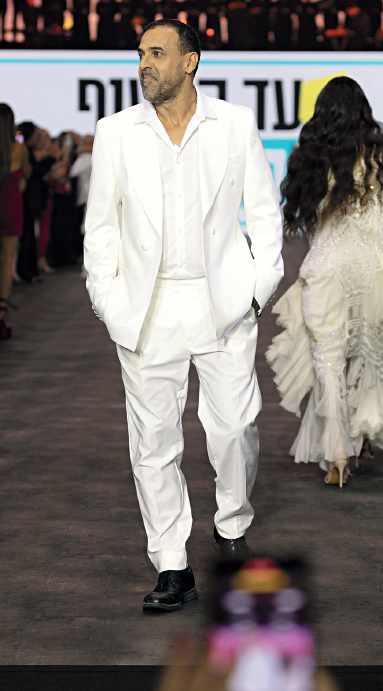
by Lee Harpin lee@jewishnews.co.uk
Conservative leader Kemi Badenoch has called for the expulsion of pro-Palestine students who disrupted lectures at City, University of London, St George’s, in protest against a professor’s links to Israel, as he thanked well-wishers for their outpouring of support for him.
In an interview with Jewish News, Badenoch further stated that students involved in the demonstrations who are not British citizens should have their visas revoked.
Israeli professor Michael BenGad, an economics professor at the university, has been the target of a month long campaign by pro-Palestine activists aiming to have him removed from his position. The campaign has included posters on campus labelling him a “terrorist”, a masked group storming his classroom, and even an alleged threat to behead him.
During a visit to Menorah Primary School in northwest London, Badenoch compared the protesters to “modern-day Brownshirts”, stating: “If you look at what is happening there, it is out and out antisemitism.”
She added: “What we need to see is those students being punished.
“We need to see expulsions and visas revoked if they’re not from our country. So that we send a strong message that behaviour like this will
not be tolerated. That’s what will be happening under a Conservative government.”
Despite these threats, Ben-Gad has vowed to continue teaching.
Students from a group calling itself City Action for Palestine disrupted his lecture, threatened him, and called for his dismissal. He was also branded a terrorist due to his compulsory service in the Israel Defence Forces (IDF) during the 1980s.
Online footage showed masked protesters chanting pro-Palestinian slogans and demanding BenGad be sacked.
Ben-Gad told Sky News: “As of about an hour ago, I finished my lecture. It was invaded by protesters who came right up to me and screamed in my face, called me a war criminal and a Nazi, refused to leave.
“I’m insisting on carrying on my duties. I think that the students have a right to expect nothing less from me.”
He also defended his military service, stating he was proud to have served in the IDF: “Israel is a country at war. We’re besieged. And we need to defend ourselves because there are 7.5 million Jews who live there right now, and without the IDF, they would simply be exterminated.”

matised? No, I am very angry.” The professor also spoke highly of Jewish students at the university, saying he was “so impressed by their dignity”.
Speaking to Jewish News, BenGad reiterated the “outpouring of support” he had received. In terms of the widespread support he has received from fellow academics, he said: “I think a very important Jewish value is gratitude. It’s something that I try to express as often as I can...people are sticking their necks [out on] my behalf. That’s not something I take for granted.”
“We will continue to support and protect our staff and students, including Michael, who has the full support of the university and its senior management team.”
In response to the campaign against Ben-Gad, more than 1,600 academics, writers, and public figures – including about 60 members of the House of Lords – signed an open letter in his defence.
The letter, coordinated by university staff, includes signatures from Lord Nigel Biggar, Conservative peer
In a statement to Jewish News following the protest, the university said: “City University of London fully supports and upholds freedom of expression within the law, but the university will not tolerate the harassment of its staff and students.
A hostage family must rebury their loved one, Ofir Tzarfati, for a third time, after forensic investigations confirmed the remains handed over by Hamas on Monday belonged to him rather than one of the other 13 deceased hostages.
Ofir, who attended the Nova festival to celebrate his 27th birthday, was abducted and subsequently murdered by Hamas. Part of his remains were recovered by the IDF in Gaza in December 2023, and were buried at that point.
In March 2024, additional remains of Ofir were returned for burial in Israel. In August of that year, Hamas published a photograph of his body.
On Monday, Ofir Tzarfati’s family said they were
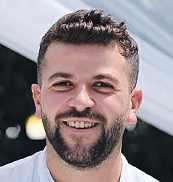
shown eyewitness video of Hamas digging a hole in Gaza, bringing their son’s remains there, burying them, then calling the Red Cross to witness the apparent retrieval.
Times of Israel reports that Israel Army Radio said that the entire incident was filmed by a military drone.
In a statement released via the Hostage and Missing Families Forum, the Tzarfati family said: “We went to sleep last night with anticipation and hope that another family would close an agonising twoyear circle and bring their loved one home for burial.
“This is the third time we have been forced to open Ofir’s grave and rebury our son. The circle supposedly ‘closed’ back in December.
“Our Ofir went to Nova to celebrate his birthday and never returned. We ask all the people of Israel not to forget the fallen, not to forget the hostages, and to continue supporting the families.”
Hamas continues to hold the bodies of 13 hostages.

and Regius Professor of Moral and Pastoral Theology at Oxford; Lord Ken Macdonald KC, former Director of Public Prosecutions; and Baroness Margaret Hodge, Labour peer and former chair of the Public Accounts Committee.
Ben-Gad, who has worked at the university since 2008, said City had offered him paid leave. He reiterated his determination to attend “every single lecture”, adding that the university was working to bolster his security to ensure he could do so.
He concluded: “Do I look trau-
During her visit to the primary school, organised by the Jewish Conservative Alliance, Badenoch observed a Jewish studies lesson and joined a roundtable discussion with community and religious leaders, as well as local councillors. The discussions, held largely behind closed doors, focused on the impact of antisemitism, proPalestine marches, and concerns about the future for Jews in Britain.
She said a government under her leadership would “look at” the Labour’s decision to recognise a Palestinian state: “I believe in a twostate solution, I think many people do, even in the Jewish community.”
Hundreds of mourners lined the roads leading to Kibbutz Be’eri on Monday as former hostage Yossi Sharabi was laid to rest nearly two years after his abduction.
Sharabi, 53, was kidnapped from his home during Hamas’s 7 October assault and killed months later when the building in which he was being held collapsed following an Israeli airstrike nearby. His remains were returned to Israel earlier this month under the US-brokered Gaza deal.
President Isaac Herzog joined the Sharabi
family, friends, and former hostages for the funeral, describing the moment as “a day of sorrow and accountability”.
He said: “Dear, beloved Yossi, today we accompany you to enter your eternal rest – at last, your eternal rest – in the soil you so loved. Forgive us, Yossi, for not saving you, for not bringing you home sooner.”
Sharabi’s wife, Nira, addressed the crowd in tears. “I go to sleep alone, I wake up alone.”
Yossi Sharabi is survived by his wife Nira and their daughters Yuval, Ofir and Oren.
A new peer-reviewed study led by Israeli researchers has defined a unique form of trauma suffered by families of hostages taken during Hamas’s 7 October attacks, offering what experts call the first evidence-based framework for understanding the long-term psychological effects of mass kidnapping.
Published in the American Psychological Association’s journal Psychological Trauma: Theory, Research, Practice, and Policy, the paper was authored by Dr Einat Yehene and
Shir Israeli of Tel Aviv-Yaffo Academic College, together with Prof Hagai Levine of the Hebrew University-Hadassah School of Public Health.
Drawing on in-depth interviews with relatives of those abducted from southern Israel, the researchers identified six recurring themes that shape families’ lived experiences.
The authors argue that mass hostagetaking, unlike individual disappearances, triggers “multisystemic trauma” extending far beyond the affected families to entire societies.
Jewish community leaders have called on ministers to adopt a sweeping national strategy to tackle antisemitism after the Yom Kippur terror attack at Heaton Park Synagogue in Manchester, arguing that the UK must act against the extremist ideology that motivated the attack.
A new policy document – After the Heaton Park attack: Towards a Comprehensive Government Strategy on Antisemitism – has been jointly issued by the Board of Deputies of British Jews, the Jewish Leadership Council (JLC) and the Union of Jewish Students (UJS), following consultations with the Community Security Trust and others, including detailed proposals for policing, education and online regulation.
It sets out urgent priorities across policing, extremism, universities, and civil society, warning that while the government’s initial response has been appreciated, “emergency steps alone will not be su cient to meet the long-term, society-wide challenge” posed by antisemitism in the UK.
The paper highlights the need for sustained visible policing around synagogues and schools, tougher enforcement on violent rhetoric at protests, greater powers for the Charity Commission to shut down extremist fronts, and tighter rules to confront harassment and incitement on university campuses, including chants such as “Globalise the Intifada” and “Khaybar, yaa Yahood”, which calls for violence against Jews.
The document also calls Islamist antisemitism “the ideological threat” behind the Heaton Park attack, and urges action against groups linked to Muslim Brotherhood or supported by hostile foreign states such as Iran. It recommends expanding Prevent training to recognise antisemitic radicalisation, including
Continued from page 1
Jewish exceptionalism, or Zionist exceptionalism, has become a role model on the national stage for what these white identitarians would like to do in their own countries.”
As first revealed by Jewish News, a BA statement said “Our sponsorship of the series has now been paused and the advert has been removed.
“We’re grateful that this was brought to our attention, as the content clearly breaches our sponsorship policy in relation to politically sensitive or controversial subject matters. We and our third-party media agency have processes in place to ensure these issues don’t occur and we’re investigating how this happened.”
But calls were growing last night for the BBC to reconsider Theroux’s long-standing association with the broadcaster for whom he has made many documentaries over decades. Keith Black, chair of the Jewish Leadership Council, said: “Louis Theroux’s recent podcast featured discussion of the conspiracy theory that so-called ‘post-Holocaust Jewish exceptionalism’ underpins white nationalism worldwide. We regard this as an absurd and deeply o ensive claim.
“The programme gave a prominent platform to Bob Vylan, who led chants at Glastonbury, including ‘Death to the IDF’, a slogan widely recognised as antisemitic. As Theroux

from far-right and far-left movements. On education, the groups want clearer consequences for harassment such as “Zionists are not welcome here”, police intervention when protests disrupt campus life, and contemporary antisemitism added to the national curriculum.
Board of Deputies President Phil Rosenberg said the killings of Melvin Cravitz and Adrian Daulby on Judaism’s holiest day were a devastating blow to British Jewish life, adding: “We have seen a series of welcome announcements from the Government. However, these measures on their own will not be su cient to meet the long-term-society-wide challenge of confronting antisemitic hatred. We need to see a Comprehensive Government Strategy on Antisemitism, and this paper points the way to what that should include.”
JLC chair Keith Black said the attack had
both edited and published the episode on his own platform, he bears responsibility for its content. The BBC should reflect carefully on their continuing association with him.”
Hailing BA’s decision, Lord Austin said: “It was a very soft interview in which Theroux failed to properly challenge Bob Vylan’s hateful rhetoric. In fact, he appeared to largely agree with him.
“Theroux himself chipped in with his own misguided views that Israel is an ethnonationalist country acting as a role model for white supremacists around the world. This is a shocking statement that seriously calls into question his impartiality as BBC journalist who has produced a number of controversial documentaries about Israel. The BBC should now follow BA’s lead and drop Louis Theroux.”
Responding to the interview last week, Jewish film, TV and music producer Leo Pearlman, said: “Louis Theroux has every right to interview whoever he wants, but with that right comes responsibility. When you give a microphone to someone who proudly repeats a genocidal chant that you’re not probing hate – you’re amplifying it.
“This isn’t journalism exploring the edges of free speech ... it’s complicity dressed up as curiosity. A chant that antisemitic mobs have parroted across the world shouldn’t be given another stage, let alone sympathetic airtime.”
“shaken our community’s sense of safety and belonging”, while urging ministers to address the ideologies fuelling the threat.
“Protecting Jewish life must not end at physical security measures,” he said. “We need sustained action to combat the root causes of antisemitism and extremism which make this security funding necessary.”



The Chabad centre in Jamaica is among the hundreds of buildings devastated by Hurricane Melissa, which hit the Caribbean island directly on Tuesday afternoon, bringing record 185 mph winds, and claiming at least seven lives.
Rabbi Yaakov, Chaya Raskin and their children, who are based in Montego Bay, took shelter in a small, windowless bathroom as the community prayed remotely for their safety during the strongest storm in Jamaica’s history.
Three days ago forecasts told locals to expect a tropical storm. By the time it became clear Melissa was turning into the strongest hurricane recorded so far this year the airports were closed and it was too late to leave.
Recently renovated in 2023, the Chabad building was equipped with hurricane-rated doors and windows, which should have withstood the storm. However, Melissa’s unprecedented force blew the main glass door o its hinges and shattered most of the windows.
Additionally, Rabbi Raskin told Chabad.org that his daughter’s room is “gone”, along with freezers packed with kosher food – provisions meant to serve the Jewish community in the storm’s aftermath.
Hurricane Melissa has now claimed at least seven lives: three in Jamaica, three in Haiti, and one in the Dominican Republic.
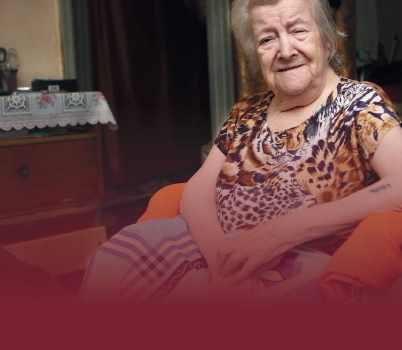

“I met 168 people who went to hell and came back.” Glenn Cohen doesn’t mince his words. Frantically drafted into the IDF’s Hostage Negotiations Unit when disaster struck Israel, the gentle mannerism of the former chief psychologist of Mossad masks a steely resolve
“There was no protocol on 7 October. It was complete chaos.”
Cohen’s task was daunting: the first mental health professional to debrief the hostages upon their return. A responsibility, seemingly, full of contradictions.
“We had to balance giving the hostages a ‘soft landing’, but we also needed to secure critical, life-saving intelligence about others... There are tensions between these goals.
“I had a powerful memory of the trauma faced by POWs coming back after facing captivity during the Yom Kippur War. Their biggest trauma wasn’t their captivity. It was the way they were treated upon their return.
“They were locked up in a compound and interrogated for two weeks. I said... we must make sure this is different.”

Cohen’s response was to draft an unprecedented new protocol. He coined a new phrase: ‘humanitarian intelligence’.
“Imagine a diver resurfacing after scuba diving. They go through a slow, decompression process as they surface. Similarly, little by little, we exposed the released hostages to stimuli, people and noises.”
Critically, the first people hostages met on their return to Israel were their families.
“One of the most important things is to

bring comfort to the families; this is based on our Jewish values. Humanitarian intelligence is important as well as operational intelligence.”
Only thereafter would his team debrief the hostages for critical information. No other country in the world treats hostages this way, Cohen proudly explained.
Addressing more than 300 people at an event co-hosted by the JLC, World Zionist Organisation and BEACON, a Jewish professional community with over 1,200 members, with Jewish News as the media partner, there were numerous gasps as Cohen recounted unimaginable stories of resilience.
Former hostage Ada Sagi spent her 77th birthday at Jewish Care’s Holocaust Survivors’ Centre, sharing cake and memories with members, sta and volunteers.
Herself the daughter of a Holocaust survivor, Sagi was taken from her home in Kibbutz Nir Oz on 7 October and held hostage for 53 days.
Accompanied by her son and daughter in law, Noam and Michal, together with Haya Langerman from the Hostages and Missing Families Forum, she spoke about her experience and the ongoing process of rebuilding her life.
“I am hopeful again”, she said. “When I came back, I was almost broken. But every day I look in the mirror, and I

say, I am here, I survived, and nothing will break me again.
“There are still some very tough days. I lost everything – my home, my community … all we built is gone – but I hold onto a thread of hope that everybody can be rehabilitated.
“Now my second birthday is 28 November– the day when I was released.”
Members, sta and volunteers gave Ada a cake and sang ‘happy birthday’ in English and Hebrew.
Remarkably, some hostages developed the same survival tactics taught to specially trained elite IDF units. “We need to see the returning hostages not as victims, but as survivors. These people are incredibly resilient.
“Captivity is traumatic, but it is also interpersonal. Your captor is still a person. If you realise that then you can influence them, get on their good side and get your captor to do things which makes your captivity easier.”
Cohen described five core common denominators exhibited by many of the hostages: belief, realism, emotional intelligence, control and togetherness.
He cited the example of one hostage who
A powerful memoir by hostage survivor Eli Sharabi has soared into the international best-seller charts in London and New York just a week after publication.


Hostage, the story of Sharabi’s 491 days in Hamas captivity, and the murder of his wife and two daughters on 7 October, has reached No. 4 on the New York Times bestseller list and No. 10 in the UK.
He sent Donald Trump a copy of his new book with a thank-you note, saying: “Your actions have given me back my freedom, my life”.
Translated by Eylon Levy, the English edition of the book was published by HarperCollins, with additional
translations expected. Sharabi described the book’s reception as “both humbling and profoundly moving.
“This milestone is not mine alone.
“It belongs to every reader and to everyone who has supported this journey. I am deeply grateful to the international community for embracing my story with such open hearts and compassion.
“My thoughts remain with the families still waiting for their loved ones.
“We cannot rest until every hostage is back.”
Released in Hebrew earlier this year, Hostage became Israel’s bestselling book, with more than 100,000 copies sold.
acted like a handyman for his captors. They then looked after him, becoming so reliant on him that they struggled once he was freed.
Another hostage found control in ‘small wins’ – he was only a orded a shower once a month for two minutes, but found a way to extend it to three minutes. Such a technique is a critical survival tactic, according to Cohen.
Another ensured they put their own shackles on. This avoided the captors’ forcing chains on them too tightly.
A 15-year-old hostage started a ‘push-ups’ competition with his captor. Other children made up amusing nicknames for their captors.
Perhaps most remarkably, Cohen added, many of the hostages found moments of growth in captivity.
“Most of the hostages won’t experience Post Traumatic Stress Disorder (PTSD) – some will even experience Post Traumatic Growth.”
For every remarkable claim, Cohen cites an example, each more startling than the next. For example: “One of the hostages learnt Arabic whilst in captivity. He is now returning to the IDF in a more senior position.”
Concluding the evening, Cohen nonetheless warned of substantial challenges ahead during what he termed the “aftershock”.
“Conservative estimates state there are around 500,000 Israelis living with PTSD. The reality is nearly every household either witnessed something on 7 October or has a family member in combat.
“This is a huge problem and, unfortunately, we don’t have enough resources to support everyone individually. We don’t need equipment anymore. We now need help on the softer side of our nation’s recovery.”
One of the last surviving fighters of the Warsaw Ghetto uprising, Michael Smuss, has passed away in Israel.
Smuss was born in 1926, and was still a teenager when war engulfed Europe.

Aged 14, he and hundreds of thousands of Jews were forced behind the walls of the Warsaw Ghetto, the largest Nazi ghetto created during the Holocaust.
Many were then transported to Nazi death camps, most notably Treblinka.
Joining the resistance under Mordechai Anielewicz, commander of the Jewish Combat Organisation, Smuss collected helmet-repair fluids
from a German workshop to create Molotov cocktails. He said: “We filled up bottles, which were then put on roofs with the expectation that once they come, we’ll be throwing them down.” They fought valiantly with the few arms they had, and stood their ground for nine days.
Smuss was one of very few to survive, narrowly escaping death when his transport was diverted from Treblinka to a forced-labour site. He survived multiple camps and a death march before liberation. Rebuilding his life in the US, then Israel, he dedicated his e orts to Holocaust education.
by Poppy Shulman
Emerging artists, gallery owners, Jewish arts organisers and supporters gathered at Bloomsbury’s Crème Fraîche Gallery last week to celebrate the launch of the UK Jewish Arts Foundation (UKJAF).
Tania Black, chair of the UKJAF Trustees, who opened the event, said: “You are all here because you enable Jewish creativity in the UK.
“You are artists, producers; you build the platforms, raise the funds, run the spaces and commission the work. It is you who make it possible for artists to create and flourish.
“Our shared task is to make sure that the next generation of Jewish artists have the spaces, the funding, and the confidence to
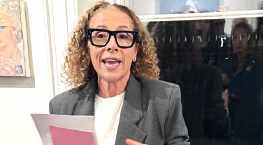
create, to question, and to thrive.”
The UKJAF has three goals: to start the Big Jewish Arts Conversation, to create the Jewish Arts Fund to support emerging artists, art collectives and bold new ideas, and to create The Jewish Arts Biennale in 2027 – a
national celebration across all art disciplines and across the country.
Alastair Falk, UKJAF director, said: “The idea for UKJAF came about from a realisation of the pressure on arts funding. This was long before the events of October 7, but of course, the unanticipated outpouring of antisemitism post-October 7 further underwrote the need for the Foundation.
“The idea is to encourage new philanthropy for Jewish arts. As the founder of Tsitsit ... I know there is a tremendous amount of Jewish creativity, but there has not been a unifying voice for Jewish Arts in the UK.
“The UKJAF is about creating a long-term strategy and that much-needed voice.” ukjewishartsfoundation.co.uk
A Jewish film festival in Sweden was cancelled after every cinema in Malmö refused to host screenings, citing security concerns.
The organisers of the Jewish International Film Festival, planned as a four-day celebration of 250 years of Jewish life in Sweden, said the event was “stonewalled” by all commercial and art-house venues in the city.
One organiser told Swe-

den’s public broadcaster SVT:
“A couple of them refer to security concerns. They are worried something might happen. I don’t understand what security threat there could be with showing Jewish films.”
Co-organiser Sofia Nerbrand said police had even o ered to provide security to cinemas.
Writing on X, she said: “The Jewish film festival that we

planned in Malmö must now be cancelled because no cinema dares to rent out its premises. It is outrageous if Sweden cannot protect cinemagoers who are interested in Jewish film.”
Sweden’s Minister of Culture Parisa Liljestrand said: “That one of our national minorities feels so vulnerable, and that organisers believe they cannot arrange events and cultural activities
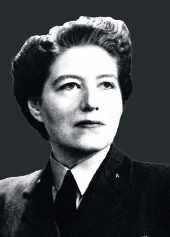
with Jewish content, is an absolute disaster for society.”
Liberal Party leader Simona Mohamsson said: “If we are serious about Jews feeling safe in Sweden, we must put an end to the culture where vulnerable people are expected to step aside for their attackers.
“Those who praise terrorism and persecute Jews have no place in our country.”

The Anne Frank Trust UK partnered with The Fed’s My Voice Project for a showcase event in Manchester’s Heathlands Village last week.
Designed to highlight the experiences of the young people that the Trust works with, empowering them to challenge antisemitism and all forms of prejudice and build bridges between communities, it also marked the launch of a new collaboration between the Trust and My Voice, established in 2016 to publish life stories of Holocaust survivors.
The partnership will enable Anne Frank Trust Ambassador alumni to apply to become My Voice Guardians, continuing their learning by safeguarding and sharing precious survivor testimonies.
Each book tells the survivor’s story in their own words, compiled through hours of indepth interviews supported by family photos, documents and contributions from My Voice’s dedicated team of volunteers. Since its creation, the project has published 48 life stories, with a further 12 in production.

Join AJEX in the 80th anniversary year of the end of World War II. The Parade is an opportunity to show our pride as Jews contributing to British society, past & present. We will honour the thousands of Jewish men & women who fought for our freedom. Never been before - this is the year to join us. All ages are welcome. Book to march by 4th November at www.ajex.org.uk












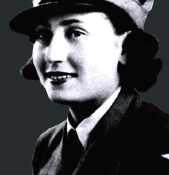




For Zamaswazi (Swati) Dlamini-Mandela and Zaziwe Dlamini-Manaway, the journey to Israel was both personal and profound, writes Annabel Sinclair.
Carrying one of the most powerful family heritages in modern history, the granddaughters of Nelson Mandela travelled to the region days before a ceasefire was declared, to see the reality for themselves.
“It’s a different vantage point when you’re sitting with families and victims,” says Swati. “Being there in person changes everything.”
Their visit was organised by the National Black Empowerment Council, taking them from the ruins of Kibbutz Nir Oz to the Gaza Humanitarian Foundation. They met 7 October survivors, senior Israeli officials – and a woman whose strength, they say, will stay with them forever.
“Rachel Goldberg-Polin was extraordinary –the epitome of resilience,” says Zaziwe, recalling meeting the mother of slain hostage Hersh Goldberg-Polin. “She held on for over 300 days knowing her only son was alive, then learnt he’d been killed. She was still smiling, talking about peace, hoping for a Truth and Reconciliation Commission like in South Africa. I was in awe.”
Swati adds in agreement: “She was so determined to keep fighting for the hostages who remain. She wants healing for everyone – Israelis and Palestinians. That strength gave us hope.”

At the Nova festival site and in kibbutzim near Gaza, they met survivors who had lost friends, parents and children. “To hear their stories face to face was devastating,” says Swati. Days later, they assisted with aid distribution in Gaza. “The destruction was total,” says Zaziwe. Families displaced, children deeply traumatised... People just wanted the war to end.”
They were also struck by the humanitarian operation’s logistics. “We saw Israelis, Americans and Gazans coordinating aid,” adds Swati. “It gave us hope cooperation is still possible.”
That hope, they say, defines their family legacy. But the South African government’s stance – leading a genocide case 8against Israel and hosting Hamas representatives – differs.
A fragment of correspondence between the Imperial Assyrian court and the Kingdom of Judah has been discovered in an archaeological excavation in Jerusalem, in what is believed to be the first ever Assyrian inscription from the First Temple period (8th–7th centuries BCE) found in the city.
The small pottery fragment, bearing a cuneiform inscription in the Akkadian language from about 2,700 years ago, was found near the Western Wall of the Temple Mount. It was discovered during wetsifting, (a method for recovering small and fragile artifacts by passing excavated soil or sediment through screens in water), at the “Archaeological Experience” in the Tzurim Valley National Park – a joint project of the Israel Nature and Parks Authority and the City of David Foundation.
Staff member Moria Cohen said: “I was sifting the soil and suddenly noticed a potsherd (broken piece of ceramic material) with a strange pattern. I looked closely, and it seemed like cuneiform script – which felt so unlikely, because even though many fascinating finds have been uncovered here, we’ve never found anything like this. I checked again, and when I realised it wasn’t decoration but actual cuneiform writing – I screamed with excitement.”
She added: “The thought that after 2,700

years I’m the first person to touch this fragment – it’s incredibly moving. It’s truly a oncein-a-lifetime find.”
Israel Antiquities Authority excavation director, Dr. Ayala Silberstein, said the inscription “provides direct evidence of official correspondence between the Assyrian Empire and the Kingdom of Judah. It appears this area served as a centre for high-ranking officials and ministers.”
Experts believe the fragment was once part of a royal bulla – a seal impression used to authenticate an official letter or shipment from the Assyrian royal court.
Analysis of the inscription and its content suggests that the sealed document, sent from a
distant location, likely from one of Assyria’s main administrative centres such as Nineveh, Ashur, or Nimrud, dealt with a delay in the payment of a tax or other obligation.
The text specifies a deadline – the first day of the month of Av – and mentions a “chariot officer” (literally, “the one who holds the reins” in Assyrian), a high-ranking figure responsible for transmitting official royal communications.
Although the fragment does not include the name of the King of Judah to whom the message was addressed, its chronological context and partial text suggest it was sent to the court of one of the Judean kings –Hezekiah, Manasseh, or Josiah early in his reign – when Judah was a vassal kingdom under Assyria.
Such items served as intermediaries between Assyrian emissaries and Judean officials, conveying official instructions and tax demands.
Israeli Minister of Heritage, Rabbi Amichai Eliyahu said the discovery was “impressive evidence of the city’s status as the capital of the Kingdom of Judah some 2,700 years ago, and of the depth of its ties with the Assyrian Empire just as described in the Bible.
“This rare discovery illustrates, once again, our deep roots in Jerusalem, which is the spiritual and national centre of the Jewish people.”
Swati is careful but clear. “The government’s position doesn’t speak for every South African,” she says. “Our visit was humanitarian. We came to listen and to learn. What we witnessed was the pain of ordinary people, not politics.”
Both women believe their grandfather would have rejected terror “outright”. “He stood for dialogue and unity,” says Zaziwe. “He would be at the table today, trying to bring leaders together.”
But their unequivocal stance on the “apartheid” comparison gives their visit its most powerful statement. “Apartheid was governmentmandated racial separation,” they say. “What we saw in Israel and Gaza is very different. There is no comparison. We witnessed communities – Jewish and Arab – living, working, marrying, side by side. Equating the two misrepresents both histories.”
For the sisters, that distinction is about truth, not politics. “We’re not politicians”, says Swati. We just want to learn, contribute where we can and be part of something that builds, not divides.”
They return to their grandfather’s central lesson: forgiveness. “One of my favourite quotes of his is when he left prison,” says Zaziwe. “’If I don’t leave everything behind me, I may as well stay in prison.’ Speaking to Rachel [GoldbergPolin], I saw that same spirit in her. She’s living proof forgiveness and healing are possible.”
Indonesia will be barred from hosting Olympic events until it removes a ban on Israeli athletes, the International Olympic Committee has said.
Athletes from Israel have been denied entry to Indonesia for the World Gymnastics Championships.
The IOC has responded by saying it will end all dialogue with Indonesia over staging the Olympic Games, Youth Games or any other IOC event until it changes its policy.
The IOC also said it would advise international sports federations not to let Indonesia host any events unless the situation changes, and encouraged bodies to adapt their qualification criteria to guarantee access for all athletes when assigning events to host countries.
It has previously been reported that the Indonesian capital Jakarta was considering a bid for the 2036 Olympic Games.

SAVE THE DATE: MARCH 2ND – 6TH 2026
Join us as we look to the future with renewed hope and pride on our next Technion UK mission to Israel. We will explore how Israel continues to thrive – advancing science, technology, and innovation while honouring its heritage and humanity.

This unique journey will offer an inspiring overview of Israel’s academic, industrial, and social achievements, with visits to worldleading institutions, insightful briefings, and moments of reflection and connection with the people shaping the country’s future.
For more information please call or message Ida on WhatsApp +44 7879 494 078 or email IDA@TECHNIONUK.ORG or call 020 7495 6824


by David Patrikarakos
‘Ezra.’ Written in Arabic lettering (that I can still just about read), the name of the great Jewish priest and scribe stretches across the front of a small general goods shop in Qamishli market – the souq that still dominates the centre of the major city of Rojava, the Kurdish-controlled region of Syria.
I’m in Rojava to understand whether the post-Assad Syrian state will hold or break down as its minorities splinter into internecine war. But though modern geopolitics are inescapable here in Syria, it is also a place where the pull of history is everywhere, especially if you are Jewish.
The Jewish story in Syria’s far northeast is modest but remarkable. It begins, as so many stories here do, with the collapse of empire.
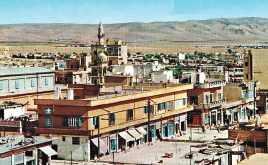
When the Ottoman frontiers were redrawn after the First World War, the French created new towns to anchor their colonial borders. One was Qamishli, founded opposite Nusaybin – an ancient Jewish and Christian centre that found itself suddenly across the new line in what is now Turkey. Families from Nusaybin crossed into Qamishli, among them a few hundred Jews with roots stretching back to biblical Mesopotamia. They brought with them Judeo-Aramaic speech and a trading instinct honed in the bazaars of Mardin and Mosul. The Jewish presence here was not some colonial import but part of the deep Semitic fabric of the region.
By the 1930s, about 250 Jewish families –perhaps 2,000 to 3,000 people – lived here. They opened textile shops, goldsmiths, and small import businesses. A synagogue was built; later, a Jewish school opened briefly in 1947. Relations with their neighbours –Kurdish farmers, Assyrian merchants, Armenian craftsmen – were largely pragmatic. Everyone needed everyone else.
Qamishli Souq became the stage for this daily coexistence. Jewish stalls were part of its rhythm: the smell of spices, the bleating of goats, the chime of Hebrew alongside Arabic and Kurdish. In nearby Hasakah, too, Jewish shopkeepers bartered in the markets and their synagogue stood beside Assyrian churches and Kurdish mosques.
Raymond James, Golders Green invites you to discover more about Aliyah at one of our upcoming seminars, featuring guest speaker Dov Newmark – Aliyah Adviser
16:00 – Tuesday 11th November 2025 | North West London
17:00 – Wednesday 12th November 2025 | North Manchester
For more information, call 020 8202 1944 or email us at GoldersGreen@RaymondJames.com
Visit our website at GoldersGreen.RaymondJames.uk.com or scan the QR code to register.
With investing, your capital is at risk. Tax treatments are subject to individual circumstances and are subject to change.
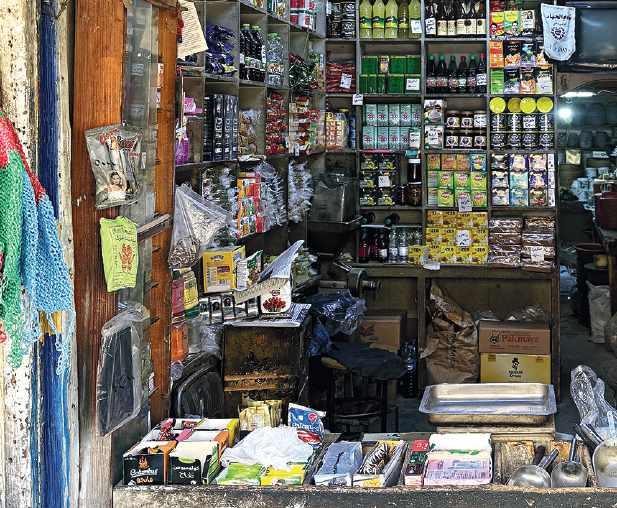

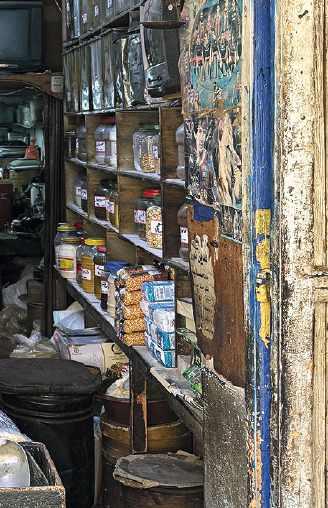
But in 1948, everything changed. The birth of Israel, Arab defeats, and waves of antiJewish hostility turned centuries of coexistence brittle. Shopkeepers were pushed out, some sold cheaply, others handed keys to trusted neighbours before slipping away to Lebanon or Israel. By the 1960s perhaps 800 Jews remained in Qamishli. After the Six-Day War of 1967, most of the rest departed, smuggled across borders or flown out under quiet arrangements with Damascus. By the 1980s, the community was gone.
Today not a single Jew is known to live in Qamishli. Walk the souq and you hear only the calls of Kurdish and Arab vendors, but in the dust and noise there remains a faint echo of a lost people – not least in the memories of those like my friend and comrade Aziz Othman, a Qamishli native and my guide to the city and the intricacies of Rojavan politics.
Aziz lights up when he remembers the city’s Jewish history. “Once this whole street would have been filled with Jewish businesses, David,” he says with a broad grin. He talks brightly about the contribution of the Jewish community to Qamishli life; about the “Jewish goldsmith” or the “Jewish cloth shop”, remembered for precise scales and honest accounts.
When you walk through the old quarter it is hard not to feel the layers of erasure. The same streets that once held a rabbi’s house and
With 20 non-stop flights a week, your winter escape starts with us. The choice is yours. Fly to the sun from either London Luton or London Heathrow. Your journey, your airport.
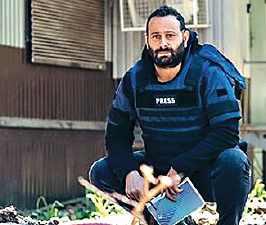
a Jewish bakery now host displaced Syrian families and YPG posters. Children play football beside crumbling doorways where mezuzahs once hung.
Culturally, the Jews of Qamishli belonged to the wider Kurdistan Mizrahi world: a tapestry of communities in Iraq, Iran, and southeastern Turkey who spoke Judeo-Aramaic and maintained their own liturgical traditions. In Rojava’s markets they were not rabbis but traders, bridging divides in a region that has always been about exchange: wheat for cloth, livestock for salt, stories for survival.
Today, the Autonomous Administration of North and East Syria – the Kurdish-led entity
governing Rojava – presents itself as secular and pluralistic. It recognises three official languages – Kurdish, Arabic, Syriac – and frames minority protection as a cornerstone of its legitimacy.
Kurdish leaders emphasise their pluralism constantly; unlike many in the region they are seen as broadly philo-Semitic, often speaking with pride about the Jews who once lived among them. Within this context, the remnants of Jewish heritage have become symbols of the Kurds’ tolerance.
Yet that heritage also underscores the fragility of coexistence in the wider Middle East. Once Jews were an unremarkable part of everyday life. Now their absence is a warning written into the walls.
It is tempting to romanticise these ghosts, to imagine the synagogue reborn or the market chatter returning in Hebrew and Aramaic. But the truth is simpler, and sadder: the Jews of Rojava are gone, their diaspora now in Israel, Europe, and North America, carrying with them the songs and accents of a frontier that has itself dissolved into ideology. Still, the story matters.
In a region where ethnicity so often determines whether you live or die, the memory of a vanished minority remains unsettling. The Kurds who now run Rojava see themselves as stewards of diversity, and they see the Jewish people as their long-standing friends and allies. In today’s Middle East, that is both a rarity and a blessing.

For over 120 years JNF UK has worked tirelessly to develop the Land of Israel. Much of our work has only been possible thanks to the generosity of our legacy donors like Eric, who regarded the work of JNF UK as vital to realising the Zionist dream. Leaving a gift in your Will, no matter how small or large, is one of the most valuable ways you can forge an everlasting bond with Israel. Our professional and caring Legacy Team offer a range of professional services and first-rate pastoral care.
To find out more, please get in touch: Call:
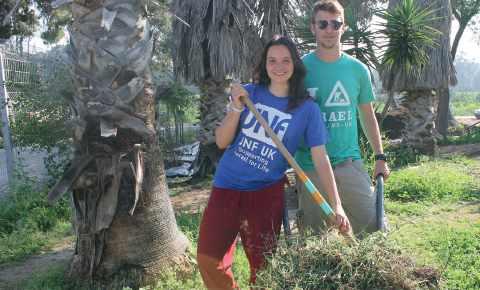


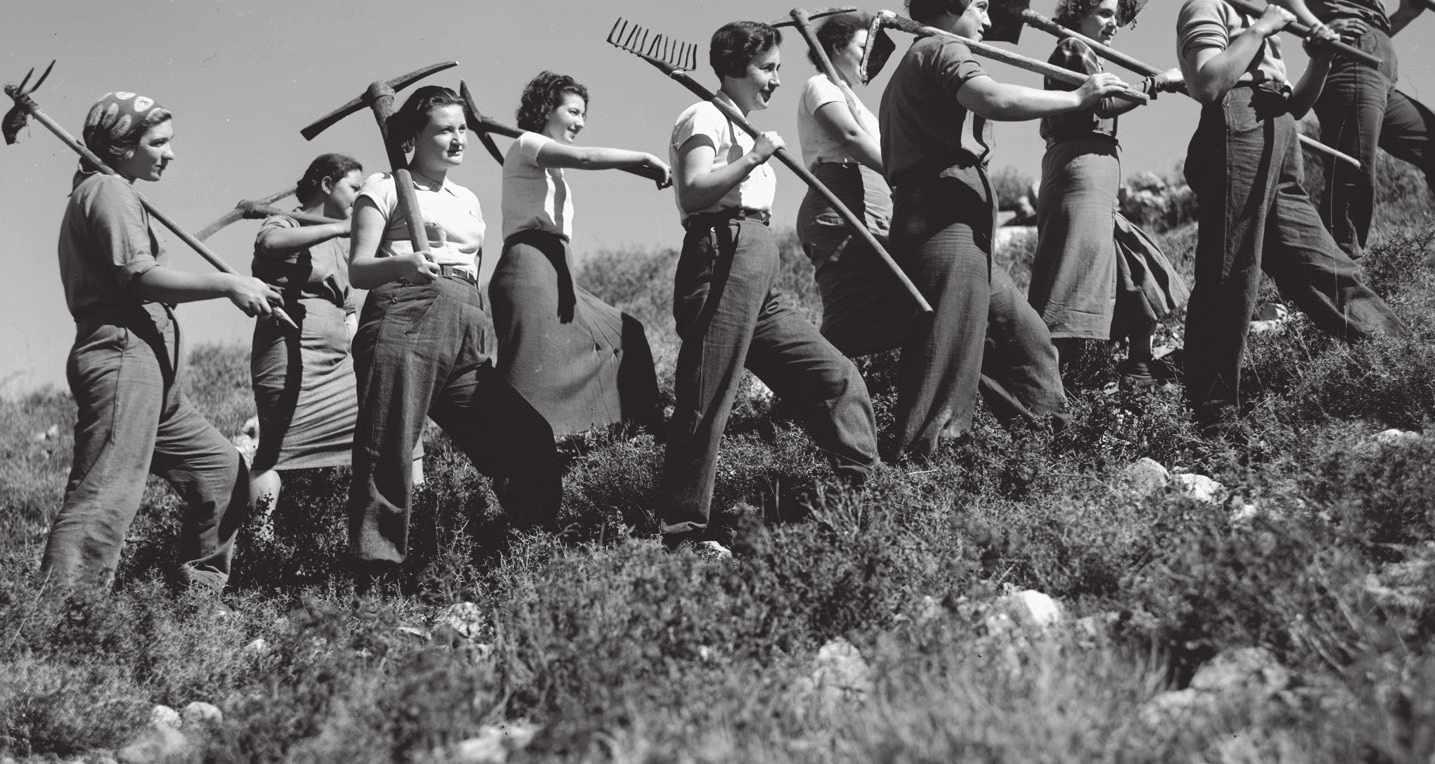




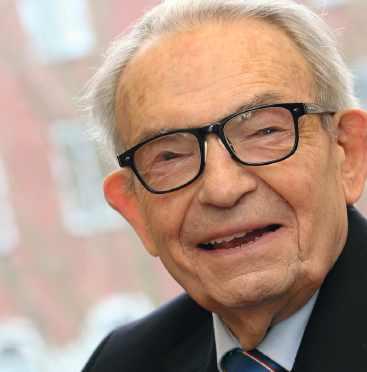
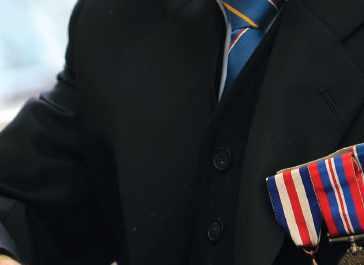

A former chair of the Jewish Leadership Council has implored Jewish leaders to speak out against Israeli government attacks on liberal democracy, declaring: “Your silence is not neutrality – it is complicity”.
Sir Mick Davis gave the concluding speech at a panel discussion held under the auspices of the London Initiative, an organisation he co-founded last year with British-Israeli educator Mike Prashker.
The event, taking place at JW3 and chaired by its chief executive Raymond Simonson, drew a packed audience from the UK, Europe and America.
On the panel were Samah Salaime, director of communications for the Arab-Israeli peace village, Neve Shalom; Dr Ivor Chipkin, a South African academic who is executive director of the New South Institute; Esther Sperber, executive director of Smol Emuni, an American liberal Zionist organisation, many of whose members come from the Orthodox world; and Tomer Lotan, head of policy for a new Israeli body called Bonim Mehadash, dedicated to addressing reforms in Israeli society and
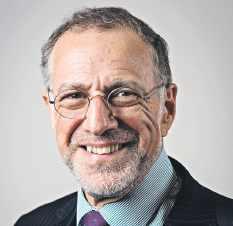
former director-general of the Ministry of Internal Security.
Dr Chipkin drew a picture of the situation for the small South African Jewish community, now numbering less than 50,000 people. It was becoming more religious and more Zionist, he said, “but it is a Zionism which is not self-critical”.
Many Jewish leaders had become “deeply associated with an authoritarian Israel” – and for him, trying to defend a liberal democratic Israel was feeling
“very, very lonely in South Africa”.
But he said that while the political leadership of the country, galvanised by the Boycott Israel movement which originated in South Africa after the Durban conference of 2001, was strongly anti-Israel, “black South Africans [generally] are largely indi erent to Jews”.
Both Mike Prashker and Sir Mick reassured Dr Chipkin and other panellists that those supporting a return to liberal values were “the majority and not the minority”, and spoke of the vital part that world Jewry had to play in convincing Israelis that such a partnership could be renewed.
Lotan, who directed Israeli strategy during the Covid pandemic, reminded his audience that “it is only three years since we had a good government in Israel, not that long ago”. He described the present government as “a disaster for Israel” and warned that “a pile of trouble waits for us”.
Sir Mick said: “This antisemitic tsunami must be pushed back. But so too must the current assault on our values by the government of Israel, because that too will be fatal to the Jewish future”.
Radiohead frontman Thom Yorke has said he would “absolutely not” perform concerts in Israel as a protest at the “Netanyahu regime”, but he has defended bandmate Jonny Greenwood over his decision to work with Israeli and Middle Eastern musicians on his own solo work.
In an interview with the Sunday Times, done prior to the current Gaza ceasefire, Yorke said: “I wouldn’t want to be 5,000 miles anywhere near the Netanyahu regime, but Jonny has roots there.”

However, Yorke said : “But you are whitewashing genocide, mate. And so am I, apparently, by sitting next to you on this sofa.”
Lead guitarist Greenwood said he “politely” disagreed with Yorke’s decision. He is married to an Israeli artist and has faced criticism for his collaborations with musician Dudu Tassa.
In 2024, Greenwood joined protests in Israel calling for the removal of Netanyahu.

Countdown star Rachel Riley received the Freedom of the City of London for her “outstanding contributions” to Holocaust education and antisemitism campaigning work.
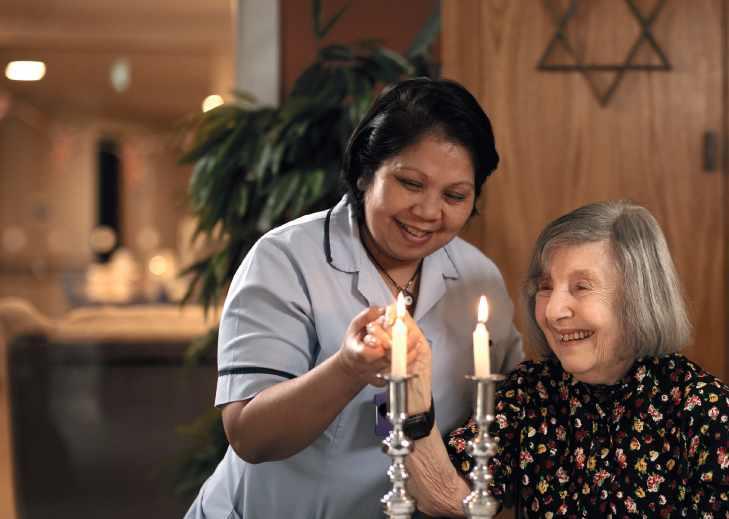

The community is mourning the loss of Jeffrey Pinnick, the former treasurer of the Board of Deputies and a leading figure in Holocaust commemoration, who has died aged 89, writes Annabel Sinclair.
Born in December 1935, Pinnick trained as a chartered accountant and went on to devote more than five decades to Jewish communal service.
He held senior roles across multiple organisations, including as chair of Yad Vashem UK, chair of the Yom HaShoah Forum, and a trustee of the Holocaust Survivors’ Centre, Boys Town Jerusalem, and Pikuach.
He was also instrumental in the founding of the All Aboard charity shop network, launched in the 1980s to raise funds for Jewish and local causes, and played a key role in rebuilding Mill Hill Synagogue and advancing Yad Vashem’s Guardian of the Memory campaign to preserve the names of Holocaust victims.
In the 2020 Queen’s Birthday Honours,
Pinnick was appointed an Officer of the Order of the British Empire for services to Holocaust commemoration and education.
Reflecting on the award, he said it came as “a complete surprise”, adding: “I was so grateful that I had even been considered worthy of such an award. Hopefully, it will also reflect on the amazing survivors and refugees of the Holocaust, as well as the wonderful people I have had the privilege of working with on these causes over all this period.”
In a statement, the Board of Deputies said: “Jeffrey made an outstanding contribution to Jewish life in this country, including through his efforts on behalf of Yad Vashem UK, Yom HaShoah, the Holocaust Survivors’ Centre, All Aboard, Boys Town Jerusalem and Pikuach. We will miss him terribly and wish a long life to his wife, Pamela, children Caroline Laitman, Richard Pinnick, Deanne Salamon, and all the family.”
Karen Pollock CBE, Chief Executive of the
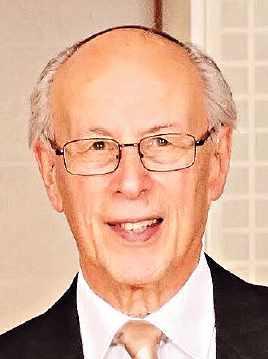
Holocaust Educational Trust, said: “Everyone at the Holocaust Educational Trust is saddened at the loss of Jeffrey Pinnick – a tireless champion of Holocaust remembrance.
“Jeffrey’s legacy will endure for generations. We will miss him every year when the Jewish community gathers on Yom HaShoah and we will remember his commitment to our shared cause. His legacy will live on through the work of Yad Vashem UK and the Board of Deputies, both of which he served with unwavering dedication.
“We remember Jeffrey with fondness and deep appreciation, always there to offer support, guidance and encouragement. May his memory be a blessing.”
In a statement to Jewish News, the family said their relative was “a true gentleman, who devoted his life not only to family, but the whole Jewish community. Humble in his ways and everything that he achieved, but leaving behind a huge legacy. He will be forever missed by his family and all who knew him.”

Forty Jewish and Muslim women have gathered in London for an interfaith ceremony honouring lives lost in Israel and Gaza and calling for a “new chapter of empathy and unity”.
Co-chaired by Laura Marks, founder of Mitzvah Day, and Nisa-Nashim, and Dr Zaza Johnson Elsheikh, President of Belief in Mediation and Arbitration and chair of Nisa Nashim, the event opened with candlelighting, poetry and prayers from the Torah, the Qur’an and Israeli poet Yehuda Amichai.
“Peace isn’t the absence of conflict; it’s the presence of compassion,” one reading declared. “It begins with small, brave acts – a conversation, a gesture, a shared meal.”
Another participant reflected: “Grief knows no flags; it only asks to be seen and named.”
Marks told attendees that, despite deep pain on both sides, “we enter this space in a spirit of friendship and aspiration to act – that’s what makes change”.
Dr Johnson Elsheikh added that the gathering was about “moving beyond pain towards practical hope”.
During the ceremony, women exchanged hand-

made friendship bags and bracelets as symbols of connection. “When peace becomes our purpose, even silence becomes powerful,” one speaker said.
Lea Misan, founder of inter-community charity Act for Change, said she came to show coexistence must be practised, not just preached. “It’s important for Jewish and Muslim women to come together to show we can do something different,” she said. “The ceasefire is a great start; now we have to create that something different.”
Later sessions focused on how to hold sensitive conversations and model respectful disagreement within communities.
Hadley Wood Jewish commu nity has appointed Rabbi Toby and Rebbetzen Bracha Weiniger as its new rabbinic couple, with the pair saying they “look forward to taking the community from strength to strength”.

The Weinigers are moving from St John’s Wood Synagogue, where they have served on the rabbinic team since their appointment in July 2021. They will succeed Rabbi Akiva and Rebbetzen Batya Rosenblatt, who are moving to Hampstead Synagogue.
Rabbi Weiniger received his semicha in 2024 from Rabbi Shraga Feivel Zimmerman of the Federation.
He studied at Yeshivat Har Etzion in Israel for several years and graduated with a first-class law degree from the London School of Economics.
Rebbetzen Bracha Weiniger studied in Jerusalem and is now pursuing a PhD in chemical biology at Imperial College London. She holds a MSc in Chemistry with Medicinal Chemistry from Imperial. The Weinigers said: “Our years at St John’s Wood have been an extraordinary privilege, marked by the chance to serve a vibrant community and learn from an inspiring Rabbinic team.
“We are energised by the warmth, ruach and community spirit we already felt so strongly in Hadley Wood during our trial Shabbat.” Chair of Hadley Wood Jewish Community, Mark Ross, said the couple “bring warmth, intellect, enthusiasm”.
A new attempt has been made by property developers to build a tower block in the City of London which would have the effect of blocking out the light to Britain’s oldest synagogue, Bevis Marks, writes Jenni Frazer.
Last December, in a nail-biting vote concluded only an hour before Shabbat, the City of London Planning Committee turned down – by 14 votes to eight – an application by property developers WELPUT to erect a 43-storey tower block which would have overshadowed the 300-year-old synagogue.
It was the second time in two years that the Planning Committee rejected the property developers’ bid. Previously the developers had hoped to build an even taller building of 47 storeys, but had scaled back their plans for this second attempt.
The proposal – which it was claimed would
provide 2,400 office jobs – also contained a variety of community “sweeteners” such as two “multi-faith centres” and an external climbing wall at the tower, sited over three buildings, which would be demolished, next to the synagogue. One of the buildings is a Grade 2 Heritage building, Holland House.
There were more than 1,000 objections to the previous proposal by supporters of the synagogue, including Chief Rabbi Mirvis.
At that time, Bevis Marks campaigners repeatedly told the City authorities the project would effectively cut out both daylight and sunlight to the synagogue and its courtyard, and make it difficult to see the moon on occasions when special prayers had to be recited.
The developers insisted that their surveys found that the impact of the tower on the synagogue would be “negligible” or “minor”,
a conclusion which was successfully challenged by the synagogue.
Now, however, the developers are making a renewed attempt to persuade the City authorities to acquiesce to their previous proposal, and their appeal means the Planning Committee will have to defend its decision to reject WELPUT’s scheme on two separate occasions.

At that time ironically the synagogue – and the buildings, which would have to be demolished if the tower block is to be built – lie in the City of London’s own Heritage Conservation Area, whose policies say no tall buildings can
be granted planning permission. The developers have written to the Secretary of State to appeal against the December 2024 refusal of their application, and there is now to be a public inquiry, with people having until 11 November to make representations on the matter.

A motion calling for a review of Hertfordshire County Council’s investment policy was passed to the council’s Pension Fund Committee after a heated meeting sparked by a petition urging divestment from Israel-linked companies.
While the petition – organised by Peter Segal, the Jewish chair of St Albans Friends of Palestine, and promoted by the Palestine Solidarity Campaign – explicitly targeted firms “complicit in war crimes” in Israel, the motion approved by councillors did not mention Israel at all, instead asking only for a review of the county’s Responsible Investment Policy.
Opponents of the petition warned the campaign risked politicising pension governance and fuelling antisemitism across the county.
Ahead of the meeting, Hertsmere Borough Council leader Cllr Jeremy Newmark urged county leader Cllr Steve Jarvis to reject the motion outright, describing it as “divisive” and “damaging to community cohesion”.
“Here in Hertfordshire, our strength is our unity,” he said in a video message. “Whatever the

intention, this threatens to politicise pension management and divide our residents. Let’s protect our pensioners, protect our cohesion and build our shared future.”
Newmark, whose borough includes one of the UK’s largest Jewish populations, also wrote to councillors warning the petition “fundamentally misrepresents both the legal framework governing pension investments and the companies it targets.”
Councillors voted 37–36 in favour of referring the motion to the Pensions Committee for review. In line with council convention, Chairman Cllr Laurence Brass did not exercise a vote.
The Hertfordshire Jewish Forum led a counter-rally said to have drawn three times more participants than the PSC demonstration. Speakers included Newmark, Nivi Feldman and other local Jewish leaders, who warned that BDS campaigns undermine social unity and inflame antisemitism.
In a statement following the meeting, Cllr Brass confirmed that the motion was “a very bland and innocuous step” and “made no mention of Israel or disinvestment”.
He said his decision not to vote followed long-standing convention, adding:“Having now spoken to most members of the Pension Committee, I am reassured they will rely on professional advice and fiscal prudence, and there will not be any further review of investment policy.”
One of the most senior orthodox pulpit rabbis in the US has put his name forward for the post of spiritual leader of the Gateshead Jewish community, with the official communal organisation in the northern England town expressing “genuine excitement” at the prospect of his arrival.

Rabbi Yisrael Mantel, who has been at the Kehal Adath Yeshurun congregation in New York for almost two decades, has announced his intention to move to England.
In a letter to members of the Gateshead Jewish Community, Meir Bodner, the head of the Gateshead Kehilla organisation, described Rabbi Mantel as having “finally agreed to stand as a candidate for the Rabbonus of our Kehilla”, describing him as “highly respected, renowned both as a talmid chochom of stature and with decades of experience in rabbonus and communal leadership”.









As the new Jewish year begins and the winter darkness approaches, staying on top of your wellbeing can be hard. That’s where Project Lily’s ‘hugs’ come in.
We’re all about improving the Jewish community’s wellbeing with initiatives such as our popular free training and self-care projects like the recent Awesome August Hug.
November 17th to 23rd is Self-Care Week - so here are two things to look out for: our Send Someone a Hug campaign - we’ll be promoting the huge benefits of social self-care with a smile our FREE November self-care training – bookable now at www.projectlily.org.uk/training
We hope you’ll join us in caring for yourself and others. Have a great winter!

www.projectlily.org.uk
If you’d like to donate, we are a Registered Charity: Number 1171723



Jewish News meets... Sir Keir Starmer
Prime Minister calls out police and universities for failing to act with ‘clarity and courage’ against anti-Jewish racism.
Prime Minister Keir Starmer has called on police officers to use powers “that are already there” to crack down on antisemitic hate chants, including “globalise the intifada”, at pro-Palestine marches.
He said that within the force, “a bit of clarity about what is antisemitic is much needed”.
Speaking to Jewish News earlier this month during a visit to the Community Security Trust (CST) office in London – where he paid tribute to staff who bravely responded to the Manchester synagogue attack and those who protect the entire community every single day – the Prime Minister appeared critical of some officers’ failure to act over “clear cases of Jew-hate on Britain’s streets”, promising to sit down with police chiefs to discuss the issue.
The PM told Jewish News: “I think we need to look at how we’re exercising the powers that are already there.
“Where something is clearly antisemitic, we need to do more about it. Obviously, we will discuss with police chiefs how they deal with these incidents on the ground. But I think a bit of clarity about what is antisemitic is much needed.”
He continued: “The chanting that goes on, and the slogans that are used, absolutely have to be dealt with in a different way.”
The PM added he and the Home Secretary would “immediately speak to police chiefs about exercising the powers we have already got in relation to” slogans at demonstrations.
The Prime Minister’s criticism of current police failures to arrest individuals engaging in openly antisemitic chants came as he also

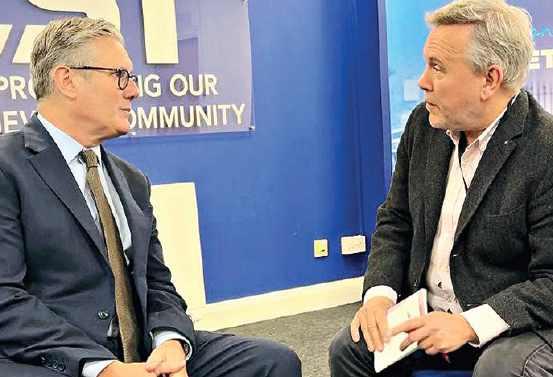
criticised the University of Oxford, saying it had been “slow” to deal with a student accused of antisemitism at a protest.
Starmer said universities “should not be a place where Jewish students fear even to go, in some cases not wanting to go to university to have the education that they’re entitled to, or if they do go, are concerned about their identity, how they’re going to be dealt with and reacted to”.
Starmer also repeated his view that the chant “globalise the intifada” was indeed an antisemitic call for attacks on Jews in this country, and elsewhere outside of Israel, Gaza, and the West Bank.
He cited Home Secretary Shabana Mahmood’s work in reviewing whether, besides using existing powers more robustly, “there are additional powers that are needed to effectively tackle the rise of hate chants against Israel and the Jewish community in this country.”
In a wideranging interview with Jewish News, the PM said he “understands” why, in the aftermath of the Heaton Park Synagogue atrocity on Yom Kippur, many now accuse him of letting down the community since Labour came to power.
“I understand the frustration that runs very deep in the Jewish community, particularly after Manchester, but not just because of Manchester,” said Starmer, adding he recognised why Jews in the UK feel “insecure and unsafe”.
He added: “It’s my responsibility to meet that challenge with action, not words.
“So I do understand that, and that is why I’ve spent time talking to individuals, to groups, and going to a number of synagogues to have those discussions, private visits, not going in with cameras, but in order to have
STARMER REPEATED HIS VIEW THAT THE CHANT “GLOBALISE THE INTIFADA” WAS INDEED ANTISEMITIC
those discussions.
“I’m absolutely determined that we will address it.”
“And we want to work with you and support you, as we have done in the past, but even more so as we go forward.”
Starmer also referenced his extended family in Israel.
He said that “through them, I felt that after October 7, it wasn’t just the most horrific attack since the Holocaust, and it was that… it was also, certainly for my family members, a visceral sense of insecurity that went right through their hearts.”
“We need to recognise that, yes, there’s the physical things that need to be done, but we need to absolutely understand the impact that this has on individuals, their families, their lives and their community, ” he added.
“We have heard loud and clear in the last few days and weeks that words are not enough,” added the PM. “Action matters, and we’re absolutely committed to that.”
During the visit to the CST headquarters, where he and the Home Secretary both addressed staff, including founding chairman Sir Gerald Ronson, Board of Deputies president Phil Rosenberg, and Jewish Leadership
Council chief executive Claudia Mendoza, Starmer spoke frankly about his recognition that was now required to change the perception of many Jews to life in this country.
He confirmed the government will provide a £10m cash injection for the CST to provide further security for the Jewish community, adding: “We have heard loud and clear in the last few days and weeks that words are not enough. Action is what matters, and we’re absolutely committed to that.
“We’re putting in an additional £10m for the protection of the Jewish community, through CST but obviously for the community.
“But money alone isn’t enough. That doesn’t get the security, doesn’t deal with antisemitism in the way that we need to.”
He also confirmed that the Government’s independent antisemitism adviser, Lord John Mann, is to conduct a review of antisemitism within the NHS.
“Because you will know, and I know, there are just too many examples – clear examples –of antisemitism that have not been dealt with adequately or effectively,” said Starmer.
“So we need to do that review. We’ve already put in place management training in relation to the NHS, but I think we need a wider review, because in some cases, clear cases are simply not being dealt with, and so we need to get to the root of that.”
But Jewish News told the PM that for many in the community, there was another problem that he had yet to deal with – the anti-Israel haters within his own party.
We also raised the example of Labour-run Brent Council in north-west London, which, despite protests from the Jewish, Hindu, and other communities within the borough, had moved ahead with a divisive twinning arrangement with the West Bank city of Nablus, at a time when tensions were already heightened as a result of the war in Gaza.
Starmer responded by saying: “Wherever we see antisemitism, anywhere in our organisations or institutions, we have to tackle it and root it out. That includes the Labour Party.
“That’s why, as you will recall, when I was elected as Labour leader in April 2020, I said my first task was to root out antisemitism in my party.
“I knew Labour needed to tackle that issue, and we needed to tackle it robustly. I will continue to do so.”
Pressed again over the backbench MPs who, to many in the community, appear to only spout hatred of the state of Israel, Starmer added: “I also said this is a job that is never done, never completed, something we need to keep on at, and we will.”
Starmer also paid tribute to the “incredible bravery” of the CST, both in responding to the attack in Manchester and in protecting the Jewish community, saying he felt the benefit of its work when he attended synagogue with his family.
A doctor who claimed the UK “is occupied and controlled by Jewish supremacy” and referred to the Royal Free Hospital in London as a “Jewish supremacy cesspit” has appeared before a medical tribunal.
Dr Rahmeh Aladwan, 31, is being investigated by the GMC over a series of posts and comments made across various social media platforms following a number of complaints including from the Jewish Medical Association UK and the Campaign Against Antisemitism.
Last month the Medical Practitioners Tribunal Service (MPTS) ruled it would not impose interim conditions on her registration, saying it did not believe complaints against her were “su cient to establish that there may be a real risk to patients”.
Dr Aladwan appeared before a different MPTS tribunal after the GMC re-referred the matter following “substantial new information” since the last hearing, including further

social media posts suggesting a “doubling down of concerning conduct”.
Aladwan was arrested by the Met police 72 hours before her second tribunal hearing last week. A video of the arrest showed an o cer saying she had been arrested “for four o ences:
malicious communications times three, and for inciting racial hatred.”
However, Aladwan’s lawyer, Kevin Saunders, applied for the proceedings in Manchester to be stayed due to an abuse of process which he said was an “a ront to the rule of law” and
Pharmacy Technician, Audiology, Dietitian, Speech & Language Therapy Physiotherapy, Occupational Therapy & Clinical Psychology Support Residents benefit from specialist care, without the need to travel.

claimed it was “a brazen attempt to keep relitigating this matter before a tribunal until the General Medical Council gets the result it wants.”
He went on to criticise Health and Social Care Secretary Wes Streeting, accusing him of “seek[ing] to undermine the rule of law and the determination of an objective independent tribunal.”
Earlier this month Mr Streeting said he would look to overhaul the way medical regulators investigate cases of antisemitism as the current system was “completely failing to protect Jewish patients and NHS sta ”.
Emma Gilsenan, representing the GMC, denied the decision to re-refer was due to “external pressure” and said it was a “necessary and proportionate referral”.
She said the case examiner’s decision was based on information surrounding Aladwan’s social media posts from 29 September to 2 October, which “takes on a new tone” and “sug-
gests a continuation and doubling down of concerning conduct”.
Ms Gilsenan said it raised questions of public confidence in the doctor and the profession.
She said the case examiner was clear they would not have referred the matter back but for Dr Aladwan’s alleged further comments “of a similar and arguably more concerning nature” which appeared to be “taking on an increasing racist and antisemitic flavour”. Dr Aladwan was also said to have been “more explicit” in her alleged support of proscribed terrorist groups, the tribunal heard.
On 7 October 2025, Aladwan described “the day Israel was humiliated” and said “Glory to the breaking of the 17 year long illegal siege. Glory to the Palestinian resistance. Glory to our martyrs. Al-Aqsa flood. Palestine.”
‘Al Aqsa flood’ is the name Hamas gave its 7 October 2023 mass-terror attack.
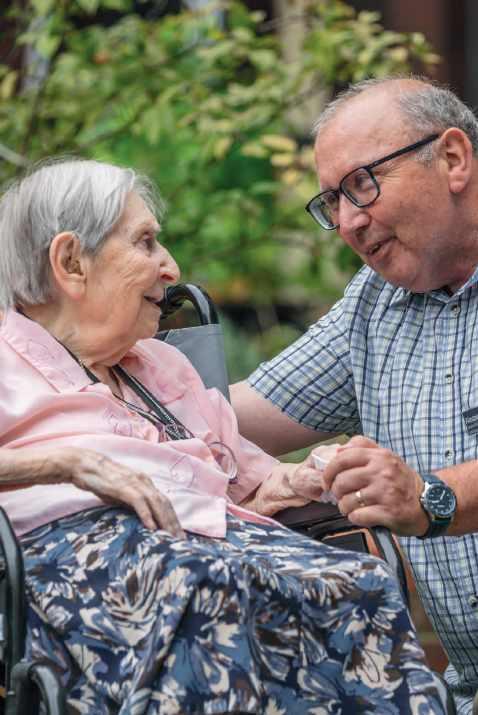

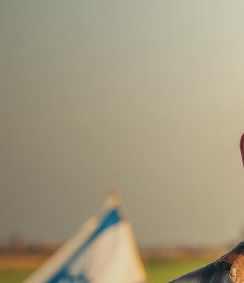

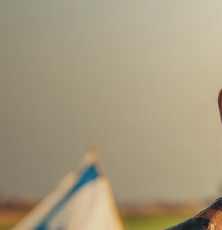


















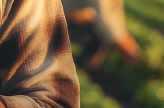

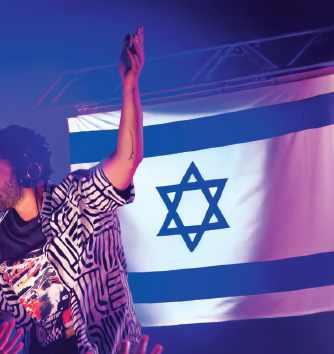











A group of 650 rabbis and cantors from across the United States have signed a letter voicing their opposition to mayoral frontrunner Zohran Mamdani and the “political normalisation” of anti-Zionism.
With a week to go until the election, the letter, titled “A Rabbinic Call to Action: Defending the Jewish Future”, cited Mamdani’s previous defence of the slogan “globalise the Intifada”, and his accusations that Israel has committed a genocide in Gaza.
The letter quotes Rabbi Ammiel Hirsch, the leader of the Stephen Wise Free Synagogue on the Upper West Side, who told his congregants in a YouTube address last week that Mamdani’s rhetoric will “delegitimise the Jewish community and encourage and exacerbate hostility toward Judaism and Jews”.
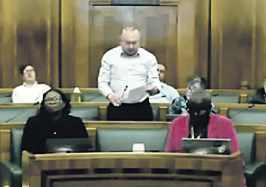
Hirsch was also one of the signatories on the letter, which included a wide range of rabbis and cantors from more than 30 states, as well as the Canadian city of Toronto. It was organised by the new Jewish Majority advocacy group, led by AIPAC veteran Jonathan Schulman.
About 60 rabbis across denominations in New York City signed, including Rabbi Joshua Davidson of the Reform Temple Emanu-El, Rabbi David Ingber of the progressive synagogue Romemu, and Rabbi Chaim Steinmetz of the Orthodox Congregation Kehilath Jeshurun.
Other influential rabbis across the country who signed include the author and former leader of Los Angeles’ Conservative Sinai Temple Rabbi David Wolpe and Rabbi Denise Eger, the first openly LGBTQ+ rabbi to head the Central Conference of American Rabbis.
While New York City rabbis previously voiced their opposition to endorsing candidates from the pulpit, that norm appears to have been set aside as Mamdani carves out a significant lead ahead of the 4 Nov. election.
Mamdani has said Israel has a right to exist as a state “with equal rights for all” and that he would “discourage” the phrase “globalise the intifada”, acknowledging that it makes some Jews scared. He also said he would arrest Israeli Prime Minister Benjamin Netanyahu if he visited New York.
The letter states: “We will not accept a culture that treats Jewish self-determination as a negotiable ideal or Jewish inclusion as something to be ‘granted’.”
“The safety and dignity of Jews in every city depend on rejecting that false choice.”
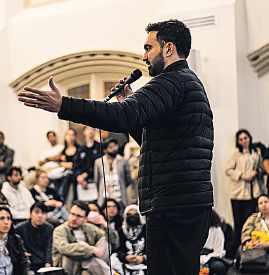
A “divisive” motion tabled by Hackney’s Green and Independent opposition groups urging the council to “cut all ties with Israel’s genocide” was defeated during an often stormy emergency council meeting.
Angrily condemning the motion, veteran Jewish Labour councillor Michael Desmond accused the Greens and Independents of promoting the politics of “hate, not hope”. He said: “Our primary duty ... is promoting com-
munity harmony and social cohesion.”
Recalling his own visits to the West Bank and East Jerusalem, Desmond said he had met with Palestinians and Israelis who held “similar views” in regards to all wanting eventual peace for the region.
Cllr Desmond also used his speech to condemn Green Party leader Zack Polanski, revealing he had signed a letter alongside Chief Rabbi Ephraim Mirvis asking him
to “rein in his local party”. Desmond said Polanski had “failed the first test of leadership – he didn’t even reply”.
In one outburst, Green councillor Alastair Binnie-Lubbock swore at the Labour benches, shouting, “It is not f***ing okay!”
He later apologised, but argued Labour’s amendments amounted to tacit approval for Israel’s “murdering innocent people”. Labour’s amended motion was carried.

























DANIEL SUGARMAN DEPUTY EDITOR, JEWISH NEWS
Earlier this month, an organisation calling itself “City Action for Palestine” launched a campaign against an Israeli academic at City St George’s University of London, Michael Ben-Gad. On social media, it described him as a “terrorist” and “evil”. It demanded that Ben-Gad be fired, that the university “apologise” for employing him and that the institution “consider such fundamental matters when hiring in future”.
For this group, Ben-Gad’s “crime” is that he is an Israeli. The group sought to rudimentarily dress this up – citing his IDF service in the 1980s, which overlapped with the 1982 Lebanon War – but gave the game away when they described his time as a lecturer at the University of Haifa, where almost half the students are Arab, as “six years working in a genocidal society”.
Last week, the group held a sit-in demonstration in one of the main thoroughfares inside a university building. Activists with their faces hidden by ke yehs – except in one case where a participant was inexplicably wearing a motorcycle helmet – screeched anti-Israel slogans and repeated the claim that “there is a terrorist on campus”.
Last Wednesday, they upped the ante, disturbing a lecture given by Ben-Gad, accusing him of having blood on his hands. The Professor told Sky News that one of those who disrupted his lecture “made a threat about having my head chopped o .”
This is, as more than one thousand academics have described in an open letter written in Ben-Gad’s defence, “targeted harassment”. The university, to its credit, as Ben-Gad himself has made clear, has supported him. It provided extra security for his classes – that security was evident

in a video showing the protestors being removed from the lecture theatre – and even offered him a period of paid leave. Two admirable defensive measures.
What they appear to have completely failed to have done – at least so far – is to take any proactive measures, specifically, holding any of the students who are part of “City Action for Palestine” accountable for their actions.
Jewish News contacted the university, asking “What action will be taken by the university against those from this society encouraging targeted harassment of a university employee? The response from the university the next day included the declaration that “the university will not tolerate the harassment of its sta and students.
“We reject the unlawful actions of this small group of individuals that is neither affiliated with the university nor its students’ union.”
The day after that response, Ben-Gad’s lecture theatre was invaded and, in his own words, one student made a direct death threat towards him.
The standard definition of ‘not tolerating’ something is to make sure that it may not continue. “City Action for Palestine” is clearly made up of current students at the university – their statements have included the line that “we will not allow evil to roam free on our campus.” Note the “our” in that sentence. Yet there have been no announcements by the university of any form of punitive action against the students in question.
There seems to be an attitude among university administrations in this country
that unequivocally extremist actions by some of its students are a trial to be weathered, rather than a problem to be faced down. When confronted with the fact that societies founded and led by their students – and even including the institution’s name in the title – are engaged in utterly repulsive behaviour, universities have sought to hide behind the fact that such groups are not “official” university societies, as if this means it is not their “official” problem.
Take the situation earlier this month at Goldsmiths (also part of the wider University of London). “Goldsmiths for Palestine” announced that they would be marking the second anniversary of 7 October with “a night of remembrance and resistance” – the “remembrance” was not, of course, in reference to the 1,200 men, women and children murdered by Hamas on that date. No, that was the “resistance” part.
The university’s response was entirely indicative of the ‘don’t rock the boat’ thought process which has been allowed to take hold in so many academic administrations. It noted that “Goldsmiths for Palestine” had no official status as a student organisation at the university and that the event was taking place off campus. Problem solved, apparently! It may not surprise you to learn that when “Goldsmiths for Palestine” occupied one of the university’s buildings for a few weeks last summer the institution humiliatingly caved in to a series of demands from the group, literally putting these on its own website. So, not an official university organisation then – just one with the power to force the college
UNIVERSITIES SEEM TO THINK STUDENT EXTREMISM IS A TRIAL TO BE WEATHERED, INSTEAD OF A PROBLEM TO BE FACED DOWN ❝
Thank you for helping to make Jewish News the leading source of news and opinion for the UK Jewish community. Unlike other Jewish media, we do not charge for content. That won’t change. Because we are charity-owned and free, we rely on advertising to cover our costs. This vital lifeline, which has dropped in recent years, has fallen further due to coronavirus.
Today we’re asking for your invaluable help to continue putting our community first in everything we do. For as little as £5 a month you can help sustain the vital work we do in celebrating and standing up for Jewish life in Britain.
Jewish News holds our community together and keeps us connected. Like a synagogue, it’s where people turn to feel part of something bigger. It also proudly shows the rest of Britain the vibrancy and rich culture of modern Jewish life.
You can make a quick and easy one-off or monthly contribution of £5, £10, £20 or any other sum you’re comfortable with. 100% of your donation will help us continue celebrating our community, in all its dynamic diversity.
Support Jewish News by visiting our donor page at jewishnews.co.uk
authorities to cave in to its demands.
Michael Ben-Gad has indicated his determination to carry on teaching, despite the e orts of those whom he accurately describes as “brownshirts”. He has said that his “main concern is for people who are far more vulnerable than I am, and I mean particularly Jewish students who have been targeted all over the country.”
In that regard, too, university responses have been sluggish. On Saturday 11 October, a student at Oxford University, Samuel Williams, led pro-Palestinian marchers in London in a chant which he said “we’ve been workshopping in Oxford… ‘Gaza, Gaza, make us proud, put the Zios in the ground’”.
By late afternoon on Monday 13 October, he had been identified via social media. National papers published his identity. And yet it still took another 24 hours for Oxford to confirm that they had suspended a student – at the same time as the police announced that an arrest had been made.
The prime minister criticised the university for dragging its feet – and he wasn’t wrong. Having seen the video, university authorities would have doubtless known far earlier than most exactly who this was – and yet they appear to have waited until an arrest had been made to take any kind of action. This made it seem that if he had not been arrested, they may have taken no action at all.
The Jewish community in this country has been begging the authorities in this country to clamp down on the hideous rhetoric and aggressive hate marches which have been allowed to fester, warning that it would lead to tragedy. Four weeks ago, this is exactly what happened in Manchester.
British Jews have also been pleading with university authorities to clamp down on the rampant intimidation of Jews on campus, which has similarly been allowed to take place virtually unchecked.
Do we really have to wait for another unspeakable horror before they too are moved to act?

















“As Rachel Riley exercises her right to drive sheep over London Bridge, after receiving the Freedom of the City of London...”
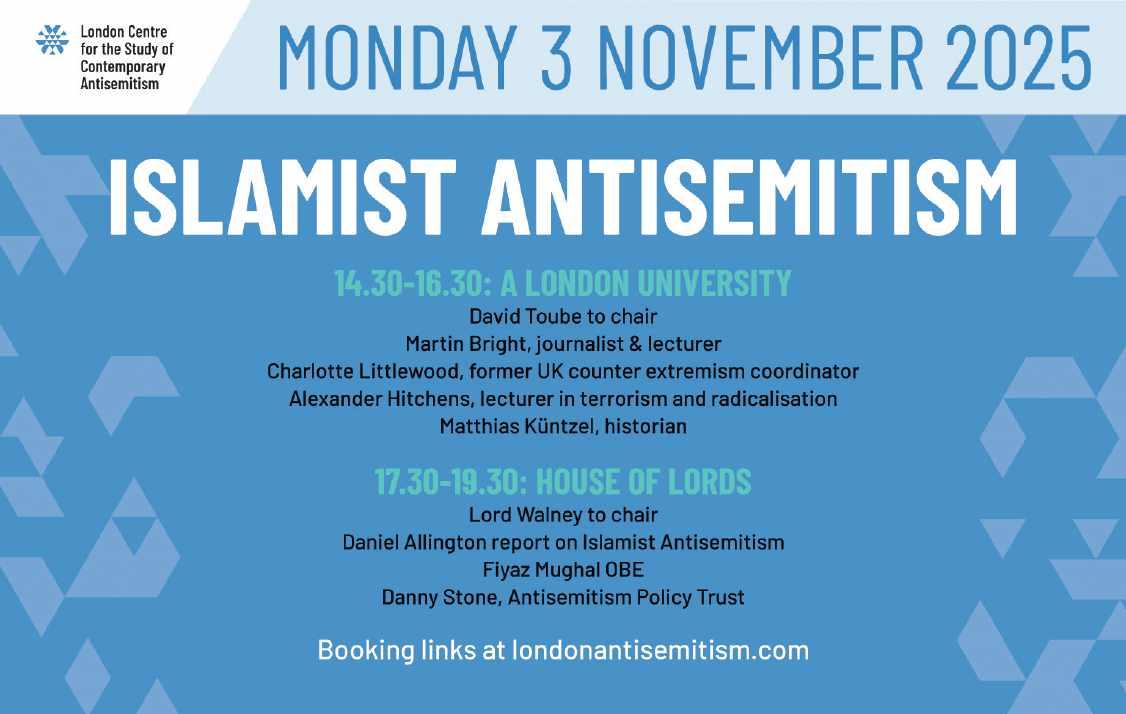

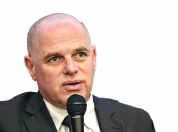

YIZHAR HESS VICE CHAIRMAN OF THE WZO
When Herzl convened the First Zionist Congress in 1897, he brought with him his years of experience working in theatre as a playwright.
He understood that a revival of the Jewish people’s national homeland would require more than keen political strategy – a background he also had, given his work as a political correspondent for one of Europe’s top newspapers at the time.
Such a gathering would require the proper presentation. From the way the stage looked to the way attendees dressed, Herzl paid careful attention to every last detail to make sure the story that both attendees and attending journalists would share back at home would be one of a serious political movement primed for success.
Now, 128 years later, the 39th Zionist Congress is convening in Jerusalem. And true to Herzl’s legacy, even many decades



after the Zionist Movement succeeded in its mission of creating a Jewish state, it remains a landmark event of major importance for the Jewish world.
And it remains a foundational expression of Jewish peoplehood: of Jews from Israel and around the world coming together to make decisions that will shape our shared future.
Given the challenges that Israel has faced these past two years – and will continue to face in the years to come – the practical implications of this year’s gathering are as important as ever.
Under the Zionist Congress’s auspices are some of the largest organisations in the Jewish world, including KKL/JNF and its $2bn annual budget, as well as the Jewish Agency and its programs in aliyah, Israel education, and aiding Jewish communities in need.
How these organisations will work and spend their money over the next five years in response to the immense challenges we face both in Israel and the Diaspora will be at stake in Jerusalem.
These challenges include: rebuilding and recovery, educating the next generation, and of course – combating antisemitism.
The horrific antisemitic terrorist attack in Manchester on Yom Kippur must be a wake-up call for Jewish leaders everywhere to redouble our e orts on this front.
The representatives making these decisions will be those democratically elected by Jews in Israel and around the world –including a delegation from the United Kingdom, elected via the Zionist Congress elections held in Britain earlier this year.
As Vice Chairman of the WZO, representing the Masorti Movement’s MERCAZ faction – a movement and faction in which we pride ourselves on holding the centre – my hope is that this Congress will put political interests aside and do what’s right for Israel and the Jewish people at this pivotal moment.
There are urgent rebuilding needs in Israel’s north and south. There are vital initiatives to combat antisemitism and connect the next generation with Judaism and Zionism in synagogues and youth groups
that need funding. Extremist forces who have a divisive, more sectarian agenda cannot be allowed to set the agenda at our collective national institutions.
Zionism has always been a liberal, pluralistic, and democratic movement, and we can’t let extremist forces change that. This would have a similar impact on our national institutions, as many feel the election of this Israeli government, the most extreme in the country’s history, had on the country throughout 2023 with disastrous consequences.
This Zionist Congress could not come at a more pivotal moment. We were all overjoyed by the return of our living hostages, and of course, there remains more to be done: all of our hostages need to come home.
But so many of us feel that after two years of war and heartbreak, our “Day After” – our 8 October – may finally be approaching.
This Congress will be a chance for the elected representatives of British Jewry, like their counterparts from around the world, to put their stamp on what that Day After will look like.














Jewish News is delighted to be entering a digital-first era with the launch of a new website and new regular glossy magazine. We are therefore seeking an enthusiastic, emerging sales force to help navigate this new era and to sell these exciting new products alongside opportunities with our portfolio of events and community-leading social media presence.
• Achieving personal and team sales targets. Working to the teams agreed yield and series framework.
• Championing digital first solutions with a particular focus on substantially growing New Business.
• Building and developing strong client relationships and attending meetings and events.
• Identifying revenue opportunities from new and existing accounts and selling solution based integrated campaigns.
• Successfully communicating and introducing digital campaigns to existing print clients.
• Effectively selling across the website, digital publications, social, newsletters, magazines and more.
• Working closely with the Jewish News Publishing and Editorial team to ensure a smooth and commercially successful relationship.
• Working with the Social Team to sell and implement new parthership content.
• Liaise with the Head of Finance to ensure all revenue is accurately reported and invoiced.
• SALARY: Approx 36k plus generous commission package but flexible depending on experience
Email a brief paragraph about yourself (and attach your CV) to Richard Ferrer – richard@jewishnews.co.uk


Our love is stronger than your hate’. I saw these words repeatedly flash up on my phone as I spent several hours doomscrolling on TikTok last week.
The phrase often appeared overlaid on clips of Omer Adam singing “Ani Rak Rotzeh Lirkod” and “V’Hishamadah” at his one-ofa-kind Madison Square Garden performance earlier this month.
Instead of the uplifting e ect its author intended, I actually found the sentiment quite disturbing. Why are we letting this moment of peak Jewish celebration be marred by thoughts of antisemitism? Sadly, it has become increasingly habitual.
A survey into ‘Jewish National Identity ’ published in February 2024 and conducted by JPR found that ‘Remembering the Holocaust’ and ‘combating antisemitism’ ranked among the three most important aspects of Jewish identity – above ‘feeling part of
the Jewish people’. Meanwhile, ‘studying Jewish texts’, ‘Jewish culture’, ‘prayer’ and ‘keeping kosher’ ranked in the bottom five – essentially denounced by British Jewry as fundamentally unimportant.
To me, these are profoundly depressing stats. They show that our history, our culture and our practice have less value and are less interesting to Jewish people than the hatred we face from others.
If this is really true, then it means that most British Jews have a primarily negative, defensive view of their ethnicity – characterised and defined not by our scholars and ancient heroes, but by the people who want us dead.
It feels like Jewish people feel more defensive and isolated – finding identity not from within but in response to hostility from the outside world. Many are exchanging Torah, family values and peoplehood for counter-protests, Instagram infographics and rallies. This is deeply wrong.
The Holocaust and antisemitism are terrible, tragic things that have happened and continue to happen to us, but they are not at the core of



our practice. They should not define Jewishness. We are so much greater than the edicts and pogroms enacted against us.
In fact, how dare we allow tragedy, evil and those who hate us to define our identity?
When I close my eyes and think about my Jewish life – racist abuse from the internet barely features in my imagination.
We have a religion and history spanning almost 4,000 years and we have a cast of inspirational role models and historical figures to learn from and celebrate. From Albert Einstein to Hannah Arendt. From Queen Esther to Steven Spielberg. These people are infinitely more interesting than Bob Vylan, Dr Rahmeh Alawadan, or any anonymous internet trolls.
Of course everyone engages with Jewish life di erently. But to me, Judaism lives in my memories of rowdy Seder nights and delighting, as a child, in being allowed to stay awake way past midnight singing “Dayenu” at the top of my lungs.
My connection to my practice sits in the back of the throat where I have screamed “Shema Yisrael”, “Shalom Alecheim” and
“Od Yoter Tov” at the top of my lungs in front of the Kotel. It is in the warming, sweet taste of chicken soup-soaked Challah and the crunch that comes from spoonfuls of reassuringly yellow Osem soup croutons.
It is in the rich, complex language that I have spent the last two years trying (and failing) to learn fluently. And on and on.
In the face of rising antisemitism, I have heard a lot of Jewish community leaders speak about the importance of Jewish pride.
At rallies, protests and vigils – which feel distinctly un-Jewish – we are urged by our leaders to wear our Magen David necklaces and kippot openly. We are told we should not be intimidated or fearful. This is of course true and important.
But to me this is not the definition of Jewish pride. True pride in Jewish life is not rooted in a place of fear and contention but rather in a place of joy and respect for our heritage. It lives in the connection with our people, our text, and our history. Our music, our success, our community.
And this article is one small way I want to celebrate our people.
Monday-Friday 12:00-4:00pm – 2 course lunch, starters and main £16.95. Happy to celebrate in style – birthday and events day. Every Friday, 7pm-9pm live music plus happy hour.





ROSA DOHERTY
It was something I saw coming, the inevitable platforming and normalisation of the disgraced musician Pascal Robinson-Foster from the punk group Bob Vylan by one of the UK’s most loved and respected interviewers, Louis Theroux.
For Jews in Britain, we have come to understand that no person, no institution, no national treasure is immune from minimising and softening the antisemitism and hatred targeted towards us.
I think it is fair to say that on no other planet would an otherwise unfamous artist who played a minor stage at Glastonbury, engaged in a hate-filled rant that invoked tropes about a minority group and called for the death of the only thing protecting that group from another Holocaust, be invited to take part in a sanitised long-form interview by one of the nation’s most-loved presenters and podcasters.
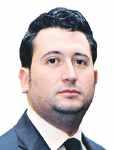
And yet we know, as well as Pascal Robinson-Foster does, that he would never have landed an invitation to such a coveted hot seat if he hadn’t spewed hate about Jews to cheering crowds of the great unwashed middle-class festival-goers, who lapped it up.
Theroux, a broadcaster famous for his immersive and often controversial documentaries, as well as his gentle and inquisitive style of questioning that is both disarming and exposing in the same stroke, seemed more interested in providing his subject with helpful excuses. The interview only sanitises the explicit chant of violence.
When Robinson-Foster is asked what “death to the IDF means”, he asks the question back at Theroux. Instead of saying “you were the one who said it on stage to thousands of people, surely you can explain what you mean”, Theroux engages in a painful, long-winded intro – “I guess my starting point is... I mean, we’ve got very di erent life experiences. I’m conscious of all the privilege I’ve enjoyed” – finally coming to the conclusion that it probably means “an end to”, rather than a call for, murderous violence.
All Vylan has to say at the end is “let’s take that, I like that”, and then say that “death” and “IDF” rhyme. Theroux allows Bob to reframe the “Death to the IDF” chant as some kind of artistic metaphor or anti-oppression slogan – poetic resistance. Do me a favour.
The typical Theroux-style inquisition that might have ordinarily pressed on the real-world implications of such a saying – you know, just one being that the IDF includes conscripts and ordinary Israelis, not just a regime – is absent.
At no point in the interview is Bob probed inquisitively about the Kanye-esque rantings he made before the calls to kill. The troperiddled tirade about a record label boss he used to work for is seemingly irrelevant to the interviewer, who is no stranger to interviewing conspiracists, racists and extremists.
Before his “death to the IDF” chant, Robinson-Foster railed about a boss who had talked about Israel and had put his name to a letter urging Glastonbury to cancel Irishlanguage rap trio Kneecap’s performance. Robinson-Foster said: “Who do I see on that list of names but that bald-headed
[expletive] I used to work for? We’ve done it all, all right — from working in bars to working for [expletive] Zionists.”
When Robinson-Foster is asked about the spike in antisemitic incidents recorded by CST after his performance – with record numbers reported the next day – the presumably well-read and well-researched interviewer o ers nothing in the way of challenge to Robinson-Foster’s suspicious, “What are they counting as antisemitic?”
Theroux o ers no context, no mention of CST’s rigorous methodology or welldocumented examples of attacks on Jews. Instead, he o ers an interesting phrase: “It was alleged that there was an uptick.”
Louis is a smart man. He knows Jews in Britain have things to be scared of. Jewish children go to school behind armed guards and yet, in the interview with RobinsonFoster, Theroux frames Jewish fears as “nervousness”.
It is not nervousness that dictates whether Jewish schoolchildren are taught what to do when a terrorist breaks through their fortified gates and armed security. It is threat.
NEIL MARTIN CHAIR OF YOM HASHOAH UK
There are some people whose names may never appear in headlines, yet without them, whole parts of our communal life would quietly unravel. Je rey Pinnick was one of those people – a man of integrity, humility, and steadfast purpose, who gave so much of himself to others and asked for nothing in return.
Je rey’s leadership was never loud or selfpromoting. He worked behind the scenes, where real change so often begins.
Whether through his many years of service to Yom HaShoah UK, as treasurer of the Board of Deputies, chairs of Yad Vashem UK, All Aboard Charity Shops and Friends of Boys Town Jerusalem – or the rebuilding of Mill Hill Synagogue and so much more – Je rey’s presence could be felt in every detail: precise, thoughtful, and quietly transformative.
I first met Je rey 22 years ago, as a young JLGB bugler when I accompanied Yad Vashem UK and AJEX to mark the 60th anniversary of the Warsaw Ghetto uprising in Poland.
Je rey, alongside Jacques Weisser and the late Sir Ben Helfgott, took me under his wing and later entrusted me with the chairmanship of Yom HaShoah UK when Je rey “insisted” that the baton be passed to me.
In truth, I inherited what he had patiently and painstakingly built over decades – not just an event, but an ethos.
Je rey created the Forum for Yom HaShoah UK with a mission to ensure remembrance wasn’t simply observed once a year but woven into the moral fabric of British Jewish life – and at that time, it wasn’t. He believed deeply that remembrance is not only about the past – it must be about the future.
For me personally, his example was both grounding and inspiring – a reminder that leadership isn’t about recognition but about responsibility, and that we owed it to the six million murdered, and the survivors and refugees who rebuilt their lives in Britain, to ensure the flame of remembrance was carried from generation to generation.
Even in retirement, Je rey’s “inner chairman” never truly rested. His thoughtful notes, gentle corrections, and mischievous PS lines in emails always carried the same core message: care deeply, prepare thoroughly, and never forget the humanity behind the task.
I INHERITED WHAT HE BUILT – NOT JUST AN EVENT, BUT AN ETHOS
About 5,000 people attended the Yom HaShoah UK event in Barnet’s Allianz Park. It was Je rey’s idea to hold a stadium event in 2015 for the 70th anniversary of Yom HaShoah, excitedly taking me to see Allianz Park and saying, “I’ll get the funds, but it needs your vision!”
Like the quote from the film Field of Dreams, “build it and they will come”, the community turned up in its thousands – and I’m not embarrassed to say that we both shed a tear together that day at what we had accomplished.
Je rey lived to see, as he called it, his “four-score-years” milestone become a reality this May as we commemorated the 80th anniversary of Yom HaShoah prominently and importantly outside Parliament. Afterwards, he wrote to me: “Any doubts
held particularly over these last 20 years as to what Yom HaShoah would look like and its future be at 80 can now, in my humble opinion, be totally dispelled!”
I was so proud to receive his hechser of approval – and to help him fulfil his enduring dream.
Je rey’s passing leaves a quiet void, yet his legacy endures in every Guardian of the Memory who lights a candle on Yom HaShoah, in the over 200 Legacy of the Holocaust boards placed in communities across the UK, and in the continued life of the many organisations he helped to shape.
He was, in every sense, an unsung hero. And it is now for all of us who were privileged to know him, work alongside him, and learn from him to sing his praises – not with grand gestures, but with the same quiet dedication and determination he showed us all, that it’s not how loudly one speaks, but how deeply one is felt.
All of us at Yom HaShoah UK wish a long and healthy life and deepest condolences to his beloved wife Pamela, his children, grandchildren, and great-grandchildren, and all who loved him.
May his memory be for a blessing, and may we honour it through the continued work he so deeply believed in.
Stand with Israel
• Comprehensive health policy, backed by Harel, Israel’s premier insurer
• Serviced by our friendly, experienced, English-speaking staff
• Private, contracted physicians and specialists
• Full hospitalization, labs, etc.
• No deductible or co-payment
For more information, visit: egertcohen.co.il/tourist-health-insurance/ 02-622-7999 • www.egertcohen.co.il • info@egertcohen.co.il








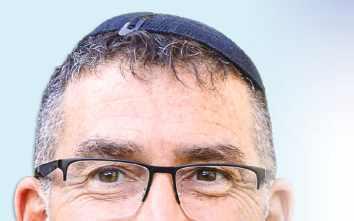

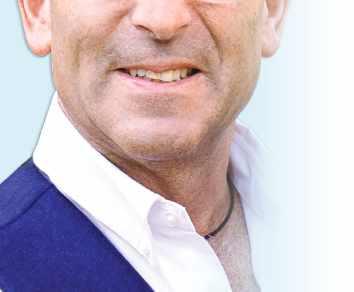






MARKING RABBI SACKS’ 5TH YAHRZEIT AND THE LAUNCH OF THE CONRAD MORRIS EDITION KOREN SACKS . HUMASH WITH TRANSLATION AND COMMENTARY BY RABBI LORD JONATHAN SACKS

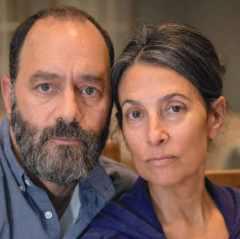
Rachel Goldberg-Polin and Jon Polin in conversation with Daniel Taub in the presence of Chief Rabbi Sir Ephraim Mirvis KBE
Monday 24 November 2025 at 8:00 pm North-West London Venue (Address provided upon registration)
Book tickets: www.rabbisacks.org/sacksconversation

The Koren Sacks . Humash is dedicated in memory of Conrad Morris, a devoted husband, father and grandfather, a loyal friend and a fearless businessman. Conrad was a lay leader of Anglo Jewry, whose deep love for Am Yisrael inspired him to work tirelessly on behalf of his people, both in Israel and in England. Humashim and other books by Rabbi Sacks will be available to purchase on the night.
KOREN JERUSALEM





Jewish employment charity Resource welcomed the Mayor of Barnet, Councillor Danny Rich, to its office to meet clients, volunteers, and staff, gaining insight into how the organisation supports individuals to develop their skills, build confidence, and take meaningful steps towards employment. Chief executive Victoria Sterman said: “His visit was a wonderful opportunity to highlight the difference our free services make helping people from school leavers to those approaching retirement.”
Fourteen children and young adults living in the assisted residential home in Stamford Hill took part in the preparations for Yom Tov. From building and decorating the sukkah and home, to purchasing arba minim, paperware, and new clothing, residents enjoyed shaking the lulav, davening, and singing Hallel. Baylis Sheli staff and volunteers ensured that every resident could take part in activities and outings, including a magic show and trip to Westcliff. One staff member said: “It’s so heartwarming to witness the children’s deep connection to their roots, and their excitement to take part in the mitzvos and routines of Yom Tov makes all the hard work worthwhile.”
A group of volunteers from across the faith spectrum were joined by Bob Blackman MP as they filled 40 wheelbarrows of weeds and 10 bags of rubbish, tidying the walled rose garden in Canons Park. The special project was part of the month leading up to Mitzvah Day – the UK’s largest faith-led day of social action – which this year celebrates its 20th anniversary. Those taking part included members of Stanmore and Canons Park Synagogue, Mosaic Synagogue, Mosaic Synagogue, the Hindu Shree Kutch Leva Patel Community, St William of York Roman Catholic Church and the Friends of Canons Park.
Over the last year, Bushey mum and personal trainer Emma Bord has taken on the challenge of running the six major world marathons in New York, Tokyo, Boston, London, Berlin and Chicago, raising money for the Essex and Herts Air Ambulance, a charity that saved her husband’s life in 2019. After completing the Chicago leg, she was given the prestigious six-star award and told Jewish News: “I wanted to demonstrate that as a mum of three, hard things can be done, and dreams can be achieved. My children have been watching this journey and were thrilled as I returned with the medal this week.”
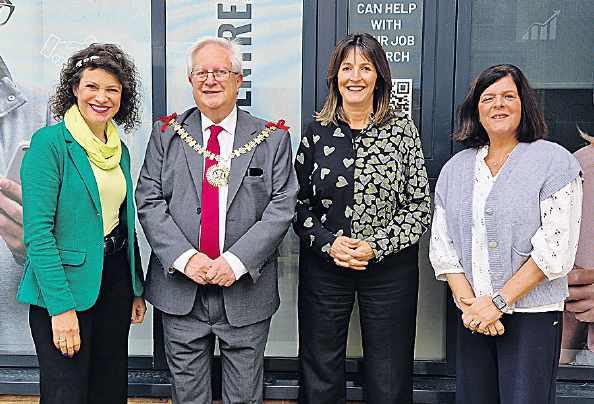



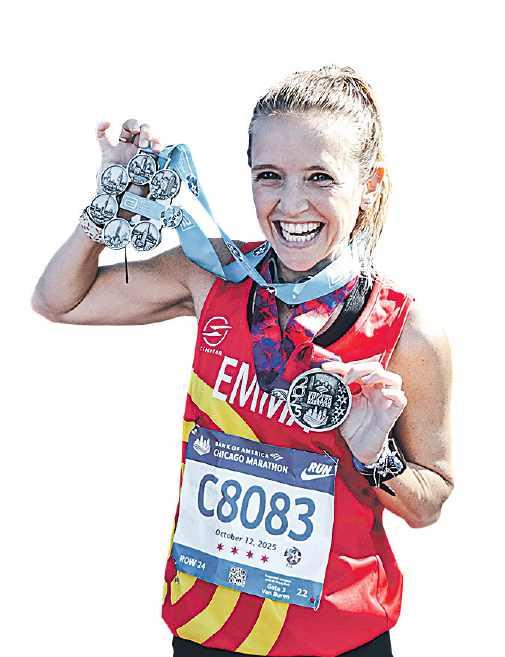

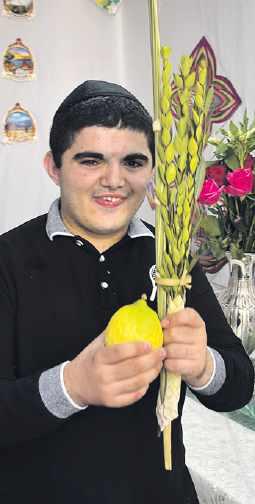


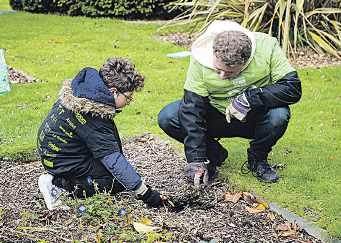




Suits from £79.50
Overcoats from £79.50
SUITS NOW FROM £69
Trouser Bargains £25
OVERCOATS FROM £69.50
TROUSERS
Raincoats from £49.50
KNITWEAR FROM £10
SHIRTS FROM £10
SHOES FROM £15
Open everyday & Sundays til 5:00pm


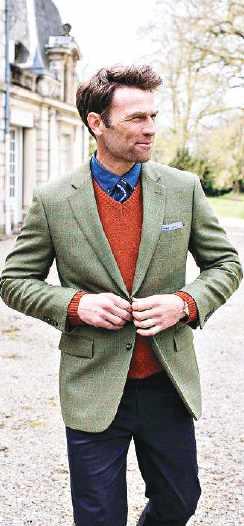
10 Golders Green Road London NW11 8LL
Opposite Cafe Nero
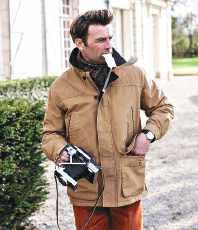





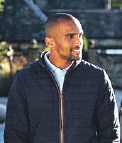


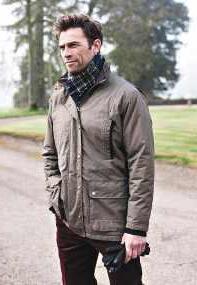
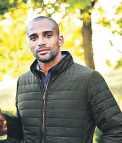







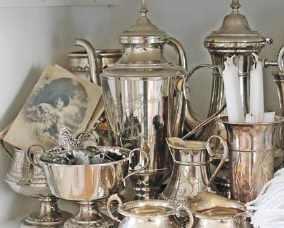

Brigit Grant chats to Erin Foster – the woman behind the show that dodged the haters, lit the candles and made faith funny again
Just when you thought HotRabbi was up for grabs, back comes Joanne in more NobodyWantsThis.
It turns out we all wanted ‘This’ and the return of the series about “prophet” Noah (Adam Brody) and his will she/won’t she convert girlfriend (Kristen Bell), means a welcome break from politicking and doom scrolling for 28 minutes x 10 episodes. Phew! Ten extremely enjoyable episodes actually, which I told the show’s creator Erin Foster fulsomely.
Given access to Erin, I’m sure some might have raised the question about the paucity of rabbis who have ‘married out’.
If there are any in the UK, please identify yourselves.
But picking holes isn’t the way to start a nice chat about this intensely Jewish series that has managed to bypass the Hollywood haters and hurdle the anti-Jewish/Zionist
blockade without being cancelled. Mazel tov! I raised this with Erin, who focused on the positives.
“This show was born out of my love for Judaism when I started converting, and my fascination with two people coming from different worlds and making it work,” she tells me. “The intensity of antisemitism really began after the show was already in development. There was a period of time where I worried about how it would be received, but the show itself shouldn’t be controversial – we don’t talk about world issues.
“For me, the best way I can share how I feel is by shining a positive light on Jewish people without underlining it too heavily. Everything in the show is based on what I’ve experienced and the beauty of Judaism.”
And that’s the charm of Nobody Wants This. Foster’s world of rabbis, podcasts, and romantic misfires doesn’t pretend to represent all Jewish life; it simply reflects one

lived, loving, funny corner of it.
The first series ended, as you will recall, with Joanne intending to sacrifice her own loving feelings for the sake of Hot Rabbi’s career.
A noble gesture that would have meant no season 2, but there will be no spoilers from me and place a figurative hand over the mouths of friends who have seen it.
Suffice to say, Joanne is still cute, stroppy, and just Jew-curious enough to be considering conversion. Or is she? Brody’s Noah is still tender, tortured and earnest, so it’s hard to imagine any woman not racing to pick up a Torah for him. But this is TV faith, and as the good book says: no delay, no play. Around the couple returns the flawless ensemble: Justine Lupe as confrontational sister Morgan, Timothy Simons as Noah’s tall nebbish brother Sasha, who is married to my fave, Esther (Jackie Tohn), forever judged by formidable matriarch Bina (Tovah Feldshuh) – “No phones at the Shabbat table Joanne!” Is Esther about to get a reprieve?
The series is, in many ways, an extension of Erin Foster’s own life. Like Joanne, she co-hosts

the hit podcast The World’s First Podcast with sister Sara, and converted to marry Jewish husband Simon Tikhman in 2019.
Earlier this year she gave birth to a baby girl, Noa.
“It’s extremely self-indulgent sitting in a writers’ room talking about my own marriage and my life,” says Erin “But for the writers, it’s helpful – a North Star. They’ll ask, did this really happen? If the room goes quiet, it’s not resonating. But if it explodes into debate – usually men on one side and women on the other – that’s a good sign. There’s a secret language women share, and when the men in the room look completely lost, that’s when I know it’s a topic worth exploring.”
That is what gives Nobody Wants This its bite, makes it real and, when Noah gets all spiritual, unexpectedly moving. “For me, not growing up Jewish, the prayers don’t have nostalgic meaning,” says Erin, “but the habit of slowing down, lighting candles, showing gratitude – that’s what fills you up. It doesn’t feel religious; it feels grounding.”
There was never going to be a good time to raise the crush we all
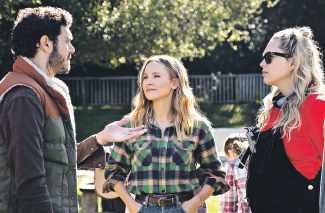
have on Noah – but I did and the daughter of acclaimed musician, songwriter and composer David Foster burst out laughing.
“Oh, I get it. I mean, who doesn’t? He’s thoughtful, handsome, emotionally available – and he’s a rabbi!” Our crush convo was fun and continued. “My first crush was Boyz II Men,” she chirped. “I honestly thought I was going to end up with one of them. It could’ve been any of them, really. My first Jewish crush, though, that was my husband, Simon. And I’ll admit, Andy Samberg is very cute… and Adam Brody? Pretty cute too.”
As our chat evolved into a scene from Nobody Wants This I longed for it to continue, but I was on borrowed Netflix time and a queue was forming in the press waiting area. “Thanks for giving us something so Jewish and joyful,” I said with goodbye.
“Oh my God, thank you!” beamed Erin. “That’s honestly all I wanted –to make something that people actually enjoy and maybe even feel seen by. I didn’t think it would connect the way it has, but it’s been really meaningful to hear that.”

Anton Lesser tells Jenni Frazer why he was drawn to his latest role in an award-winning short film
They tell actors to “never work with children or animals”, but the nearperfect synchronicity between well-established actor Anton Lesser and teenager Kit Rakusen, just starting out in his career, belies that rule.
The pair star in Beshert, a beautiful short film due to be shown on 10 November at the UK Jewish Film Festival. It is one of two winners of this year’s Pears Short Film Fund awards.
Gary Enkin’s charming script, directed by Lewis Rose, brings to life an unlikely friendship between Lesser, playing a gruff old man in a Leeds care home, and reluctant barmitzvah boy Oliver Simons (Rakusen).
Filming took place in a disused wing of south London’s Nightingale House.
Birmingham-born Lesser, who jokes that he summoned up his “all-purpose Northern accent” in order to play Mr Pinsky, fell into the part by accident.
“In the spring I was rehearsing a production of Hamlet at Stratford, directed by Rupert Goold. I was playing the Ghost and I was sharing a dressing room with the actor Elliot Levey. I’d never worked with him before but we got on well, and he told me that he’d been approached by [film critic] Jason Solomons to
direct this short film – but that he wasn’t sure he was going to be able to do it. He asked me to read the script.
“I was about a page in and I said, ‘this is brilliant’. Elliot asked me if I would play Mr Pinsky if he directed it. I said yes immediately. It touched my heart right away; and I’ve got to the age [he is 73] when if something doesn’t touch me, I’m not really that interested in doing it. If I can afford to say no to something, I will say no, because life’s too short to do something that isn’t full of love.”
It transpired that Elliot Levy could not direct the film – but co-producers Solomons and Naomi Gryn told prospective funders that Lesser was staying with the project, as a result of which the film was greenlit.
He comes from “a very loving, working-class family… my dad was a hairdresser, my mum was a dressmaker. Jewishness was part of life.
“We weren’t Orthodox and I don’t really think of myself as a Jewish actor, but I had a barmitzvah. I know that my dad’s dad was from Warsaw and the name was Lefkovich, changed when he came to Birmingham.
“My mum’s family were Cohens, and her father was a tailor.”
Though Lesser may not wholly embrace his
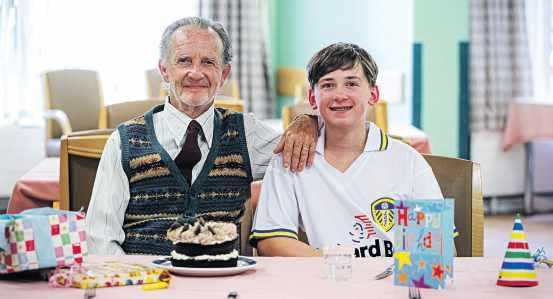

Jewish background, one of his two daughters (who prefers to use the pronoun ‘they’) was so interested in the heritage that they were prompted to have a batmitzvah. Lesser does concede that in recent years he has become more curious about that part of his early life.
After school, he went to Liverpool University to study architecture, and then spent time abroad with the Voluntary Service Overseas charity. While in Nigeria, he saw a film about the Royal Shakespeare Company “and that was it”. He gave up his job in architecture, returned to the UK, moved to London and enrolled in the Royal Academy of Dramatic Art.
Shortly after his 1977 graduation, he began working in Stratford with the RSC and has barely stopped working since. His TV roles have included Thomas More in the BAFTA-winning Wolf Hall, Qyburn in Game of Thrones, and the somewhat shy and retiring police commissioner Reginald Bright in the Morse prequel, the hugely popular Endeavour
His distinctive voice has graced numerous films and radio productions, including playing the Roman detective Marcus Didius Falco in Lindsey Davis’ award-winning “toga thrillers” for the BBC.
Today, Lesser thinks his parents must have been concerned about his throwing away a promising career as an architect “in order to become a rogue and a vagabond”. But they never expressed this concern, giving him love and support “because they just wanted me to be happy, and I hope that’s what I have passed on to my kids, too”. In fact, he says, he has been “absolutely blessed” and has rarely spent long periods out of work.
As Mr Pinsky in Beshert, Lesser tries to persuade a mulish Oliver that being barmitzvah will be a bonus in his life – and he summons up a blessing from his own long-ago barmitzvah, delivered impeccably by the actor. Then he
The film is about an unlikely friendship
explains to him what ‘beshert’ means, telling him how he met his wife and keeping close the memory of his son who died fighting in Israel. The script elegantly and concisely draws on these memories in a way many longer feature films fail to do.
As for working with Rakusen, 14, Lesser has nothing but praise. “He’s absolutely wonderful,” he says. “It was a privilege; he’s very levelheaded, so unassuming, incredibly intelligent and sensitive. He was delightful – we laughed a lot together. He was a joy to work with. If he decides to go on acting, I think he has a great career ahead of him.”
In fact, Rakusen has appeared as one of the Enid Blyton Famous Five on BBC and this year has starred in Wes Anderson’s The Phoenician Scheme and in Jay Kelly, the new film from Noah Baumbach. He is also one of the leads in the new film Good Boy, as the son of characters played by Stephen Graham and Andrea Riseborough.
So what’s next for Anton Lesser? He will be seen in the new Harry Potter series, playing Ollivander, the wandmaker. But he has also been closely involved with travelling words and music shows run by the independent company Hambletts, in which Lesser works with an orchestra while delivering extracts from the featured writers.
One is about Laurie Lee, called Red Sky at Night, and another is devoted to the work of Thomas Hardy. “They are just beautiful events – we do these shows all over the country.
“We just did a week at Wilton’s Music Hall (in London) – and if you were moved by Mr Pinsky, you will be moved by these shows, because they are very, very heartwarming.”
• The world premiere of Beshert is on 10 November at the Phoenix Cinema in East Finchley at 8pm. ukjewishfilm.org
NOVEMBER 2ND
JW3 2.30 pm

An Afternoon with Marks and Gran. Cheer up a November Sunday afternoon with the wonderful comedy writing duo, responsible for great hits such as Birds of A feather, Goodnight Sweetheart, the New Satesman and many more. Join them in reflecting on their stellar career and discussing their latest show, ‘ Dr. Freud will see you now, Mrs Hitler’ as well as some key tips on the art of comedy writing.
NOVEMBER 22ND
artsdepot
7.30 p.m

JEWsicals 2025 Then join us at the arts depot in Finchley later this month for a combination of new works and established favourites, starting with JEWsicals 2025 presented by the THE JEWish CABARET and featuring six brand new musical theatre woks in progress. One night. Countless new stories. From playful sketches to dazzling numbers, discover songs and scenes that put Jewish voices and stories centre stage.
NOVEMBER 23RD
Libra Café
Rules Schmules
Libra Café
2.15 p.m.
4.00 p.m.
How to be Jewish Again Two hilarious shows where modern Jewish women talk about modern Jewish life and what it means to start being Jewish – again!
27TH NOVEMBER
artsdepot Pentland Theatre
7.30 p.m.
Rabbi Santa’s Night of Comedy with award winning comedians Bennet Aaron and Mark Maier hosting a fantastic evening of Jewish comedy just in time for Xmas.
artsdepot Creation Space
7.30 p.m.
Bottled A work in progress as part of the Tsitsit / arts depot Residency programme, exploring how global events seep into the minutiae of everyday life.
29TH NOVEMBER
artsdepot Studio Cohen
7.30 p.m.
Bernstein, Joni and Me How does an aspiring young Jewish singer from New Zealand find her way into the lives of some of the greatest musicians of our time? An evening of songs and stories that will leave you speechless but wanting more!
30TH NOVEMBER
King Alfred Phoenix Theatre 7.30 p.m.
Forbidden Places An eight year old finds a book on the top shelf of aroom he is forbidden to enter and discovers a clue to a family secret he doesn’t dare ask about . A brand new one man show written by well known actor Jason Morrell
artsdepot Studio

7.30 p.m.
A welcome return to Buenos Klezmer for an evening of foot-stomping, heart-warming Jewish folk music of the stetl and the Sepahrdic world.
For the full line up and to buy tickets visit www.tsitsitfringe.org

Tsitsit, the Jewish Fringe Festival, is celebrating its fifth anniversary with a bumper selection of performances this month. By Caroline Friedman
"It's been a tough time for Jewish artists, so celebrating five years of Tsitsit Fringe feels like a triumph of creativity, friendship and faith in new voices," says Alastair Falk, founder of the Tsitsit Fringe Festival.
"When we launched Tsitsit in 2020 we felt sure that there was a need and that it was the right time for a Jewish Fringe Festival. There were many fringe festivals but not one that specifically focused on the work of amazingly talented Jewish creatives and celebrated the treasure trove of Jewish-themed work. We chose the name Tsitsit, a play on the Hebrew word for 'fringe', and the response we have had from theatremakers and theatregoers has been fantastic. Tsitsit is now a recognised event in the UK's fringe festival calendar.”
This year’s lineup includes bold new solo shows, fresh work-in-progress pieces, and an afternoon in conversation with two of the country’s most loved scriptwriters.

Marks and Gran
2 November, JW3, 2.30pm
The festival starts with an intimate and witty afternoon with legendary comedy writers Laurence Marks and Maurice Gran. The duo will be talking about their incredible career as one of Britain’s most successful comedywriting partnerships. After early hits such as Holding the Fort and Shine On Harvey Moon, they created the BAFTA- and Emmy-winning The New Statesman and went on to deliver some of TV’s best-loved shows, including Birds of a Feather, Goodnight Sweetheart and Love Hurts. On stage, their work ranges from Playing God to the long-running musical Dreamboats and Petticoats and its sequels. Most recently, they wrote the hugely well-received Dr Freud Will See You Now, Mrs Hitler.
Revenge – After the Levoyah
8 November, artsdepot, 7.30pm
A madcap Jewish-heist comedy set in Essex –one funeral, twin siblings and an 80-year-old ex-gangster with unfinished business. What could possibly go wrong? Written by Nick Cassenbaum, a master of Jewish comedy writing and creator of Bubble Schmeisis and the JW3 pantos.
The JEW-ish CABARET: JEWSicals 2025
22 November, artsdepot, 8pm
A joyous evening of new Jewish musical theatre featuring short new works from emerging writers and composers. Expect music, laughter and plenty of chutzpah.
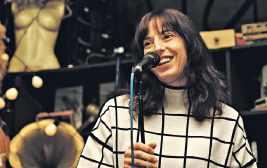
How to Be Jewish Again
23 November, Libra Theatre Café, 4pm
Gillian Fischer is Jewish but her entire life has been lived with little or no recognition of her Jewish identity. Now a mother in her 40s, she has a compulsion to connect again with her Jewish roots. Where does she start? In this hilarious one-woman show, this writer, broadcaster and actress takes us on a journey of self-discovery.
Rules Schmules – How to Be Jew-ish
23 November, Libra Theatre Café, 2.30pm
Playful, personal and poignant, Suzie Depreli’s one-person show is a funny, music-filled exploration of modern Jewish identity that finds meaning (and laughter) in the messiness of tradition. It is one woman's passive-

aggressive mission to educate the world about what it means to have an Orthodox family who eat sausages, an Asian Catholic husband who uses more Yiddish words than her Nana, and celebrate Passover without believing in God.
Bottled
27 November, artsdepot, 7pm
The mundane meets the abstract in this highly physical work-in-progress production that explores how global events seep into the minutiae of the everyday. Bottled follows three Barnet Water Company colleagues as they navigate their relationships amidst a rapidly shifting political landscape, demonstrating how political pressures leak into personal spaces. Integrating written text, verbatim
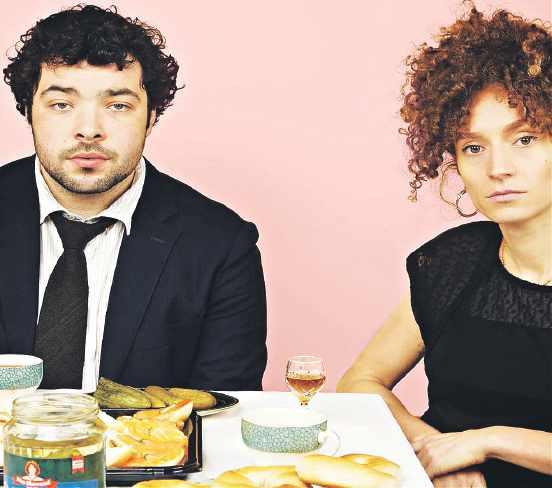
interviews and choreographed movement, the work explores the significance of water in Islam, Judaism and everyday life.
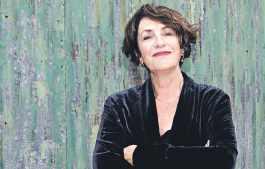
Cohen, Bernstein, Joni and Me
29 November, artsdepot, 7.30pm / 20 January – 1 February 2026, Upstairs at the Gatehouse, 7.30pm
Deb Filler’s acclaimed musical storytelling, blending humour, heart and harmony, recounts her real-life encounters with Leonard Cohen, Leonard Bernstein and Joni Mitchell. How does an aspiring young Jewish singer from New Zealand find her way into the lives of some of the greatest musicians of our time? And how does her father become more inspiring than them all? Laugh out loud, shed a tear and experience the sheer joy of these improbable, hilarious and heartwarming true stories coming to life.
Rabbi Santa’s Night of Comedy 27 November, artsdepot, 7.30pm
A festive evening of standup with a few Jewish twists. Featuring a line-up of brilliant
comedians including Bennett Arron and Mark Maier this is a fantastic evening of Jewish and Jew… ish comedy. Exploring culture, identity and holiday chaos, you can expect laughter, latkes and a little mischief.
Forbidden Places
30 November, King Alred Phoenix Theatre, 7.30pm
This true story written by Jason Morell and directed by Timothy Walker features an eightyear-old who finds a book on the top shelf of a room he is forbidden to enter. He discovers a clue to a family secret which he doesn’t understand or dare ask about. Half a century later the mystery is revealed and his world is changed forever, and he now knows why some parents need to invent stories and tell so many lies, especially to their children.

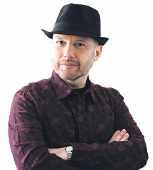
30
artsdepot,

In our thought-provoking series, rabbis, rebbetzins and educators relate the week’s parsha to the way we live today
BY RABBI ARIEL ABEL SOLICITOR AND ARMY CHAPLAIN
When I read parashat Lech Lecha, I am always struck by the way Abraham – still ‘Abram’ then – is introduced not merely as a man of faith, but as one who builds relationships. God calls him to leave everything familiar, to become a father to many nations, and Abraham responds not by retreating into isolation, but by forging connections that extend beyond his immediate household.
Among those connections, the Torah names three allies: Aner, Eshkol and Mamre. These men are described as
Abraham’s covenantal friends, partners in his pursuit of justice and defenders of his family when Lot is taken captive.
This triad of companions may seem like a small detail, but it is profoundly instructive. Abraham, the patriarch of monotheism, did not surround himself only with those who shared his precise beliefs. He entered into covenantal friendship with others who recognised the moral and spiritual leadership he embodied. In our own times, I see an echo of this ancient covenantal friendship in the relationship between King Charles and Pope Leo.
Much commentary, often critical, has arisen in Christian circles about the prospect of the two Heads of Church and State meeting in prayer. The concern seems to stem from an anxiety about doctrinal purity, or a fear that shared prayer across denominational or religious boundaries dilutes the sanctity of one’s own tradition.
But the story of Abraham teaches us other-
wise. When Abraham gathered his three allies to rescue Lot, it was not a matter of theology, but of justice.
Abraham’s greatness was not in withdrawing from the world, but in engaging it; not in fearing contamination from others, but in inspiring them by example.
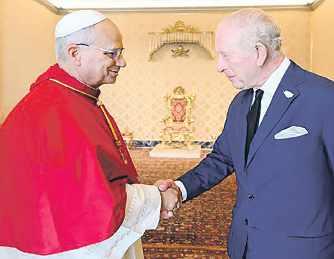
King Charles, like Abraham, bears a unique responsibility as both a spiritual and temporal figure. His kingship, while constitutional, carries the moral weight of a Defender of the Faith.
Pope Leo, similarly, leads a global flock seeking to live out faith in the modern world. When these two figures meet in prayer, it should not be seen as a compromise, but as a restoration of the Abrahamic ideal: the capacity of leaders of faith and conscience to find common ground before the Creator.
In Jewish tradition, we bless those who “seek peace and pursue it”. Peace – shalom– is

We are looking to recruit an exceptionally capable and dynamic individual to our team to focus on community building, liaison and programming. This role is for an enthusiastic, committed, self-starter who is willing to throw themselves into a challenging and fast paced environment. The position is Jewish-community focused, working closely with a number of key stakeholders and partners. The successful candidate must be excellent at building networks and relationships. They will be innovative and creative with an eye for detail, be able to work under pressure to very tight deadlines, juggle and prioritise and be a real team player within the wider OCR. The successful candidate will report to the Director of Community Affairs.
The role includes:
Community Strategy and Relationships
Build upon existing relationships with local communities (i.e. Rabbis, lay leaders and professional staff) and maintain records on interactions with, and information about, communities.
Build relationships with key partners and stakeholders (i.e. the United Synagogue Communities Department, the Rabbinical Council for the Provinces).
Act as the central point of contact at the OCR for synagogues and communities in terms of programming and practices, and coordinate office-wide communication to communities.
Salary between £44,000-£50,000, commensurate with experience.
The role is a permanent position based primarily at the OCR in North Finchley. Parttime hours and flexible working hours would be considered for the right candidate.
not the absence of di erence, it is the harmony of di erence brought into moral balance. Aner, Eshkol and Mamre represent that harmony –men of di ering backgrounds who nonetheless shared a covenantal destiny with Abraham. If our patriarch could find holiness in partnership with those outside his immediate faith, surely our modern leaders can do no less. In this light, the image of the Pope and the King in prayer is not controversial – it is covenantal. It recalls the very roots of our shared Abrahamic calling: to walk before God and be whole, together, or at least alongside each other.
We are looking to recruit a talented and creative Social Media and Digital Content Manager to join this fast paced, high profile public office. Reporting to the Director of Communications, the successful candidate will be responsible for the production and day to day management of the digital and social media content promoting the Chief Rabbi’s vision for the Jewish community.
The role is suited to someone with an excellent understanding of the ever-changing social media landscape, and a talent for video content creation.
The role includes:
Effective management of the Chief Rabbi’s social media and digital channels in order to maximise reach and impact
Planning and managing the delivery of social media and digital campaigns
Working closely with the team to plan and implement social media strategy
Providing regular videography support to the Chief Rabbi and his office
Editing and producing engaging digital content
Maintenance of the Chief Rabbi’s website
Assisting with projects in the office
Salary between £46,000-£52,000, commensurate with experience.
The role is a permanent full-time position based primarily at the OCR in North Finchley but flexible working hours would be considered for the right candidate.
To apply, please submit your CV to careers@chiefrabbi.org with a covering letter explaining why you are suited to the role with the role in the subject field. All applications must be received by 9am on Monday 3rd November.

BY RABBI NAOMI GOLDMAN KOL CHAI HATCH END REFORM JEWISH COMMUNITY
National media regulator Ofcom recently told the BBC to issue an on-air apology for the first time since 2009 after failing to disclose that the narrator of a documentary about Gaza was the son of a Hamas o cial.
The BBC’s director-general had already apologised and has accepted the ruling, but I know that it adds to a sense that I hear a lot of in the Jewish community: that the media is biased against us and particularly against Israel, and that our perspective does not get a fair say.
We are not the only community that feels like this: the Muslim community has regularly indicated that it believes that UK media is biased in favour of Israel, not against it.
I was a journalist for BBC News before I became a rabbi, and although I left in 2009, which equates to about 100 years ago in media
terms, I do remember that on most issues we reckoned that if people on both sides of the argument were protesting against us –which happened quite a lot– then we were probably getting it about right, most of the time.
I trained as a journalist twice: once at Cardi University before joining a local newspaper, and again with BBC News’ own internal training.
A stimulating series where our progressive rabbis consider Judaism in the face of 21stcentury issues

Both times the idea of impartiality was drummed into me: when you enter the newsroom, you leave your personal views outside. It is easier said than done of course because impartiality can mean di erent things to di erent people. Where the centre ground is varies according to one’s own perspective.
Jewish law is very keen to eliminate biases, particularly in a court of law.
In Leviticus 19:15, it says: “You shall not favour the poor nor honour the great, but in justice you will judge your people.” It’s an invitation to look at everything critically and
examine both sides of the argument before coming to a judgement.
How many of us really examine both sides of the argument before deciding what the truth is?
The challenge for journalists is that there is never only one story, never just one narrative. The truth is often complex and multi-faceted. It doesn’t matter how certain you are that you are right – there is almost always another side.
Our rabbinic tradition faces up to this very same challenge.
The minority opinion is always recorded in the Mishnah and Gemara, even if the law goes with the majority.
We are absolutely right to hold our media organisations and our journalists to account when they get it wrong.
But we also need to acknowledge just how complex and nuanced our world is – and that sometimes there are two sides to a story.









ANTIQUES
Antique – Reproduction – Retro Furniture (any condition)
Epstein, Archie Shine, Hille, G Plan, etc.
Dining Suites, Lounges Suites, Bookcases, Desks, Cabinets, Mirrors, Lights, etc.
House clearances
Single items to complete homes
MARYLEBONE ANTIQUES - 8 CHURCH STREET NW8 8ED 07866 614 744 (ANYTIME) 0207 723 7415 (SHOP)
closed Sunday & Monday
STUART SHUSTER - e-mail - info@maryleboneantiques.co.uk
MAKE SURE YOU CONTACT US BEFORE SELLING


Furs, Jewellery, Old Costume Jewellery, Watches, Silver, Designer Bags, anything vintage.
01277 352560
Friendly Family Company established for 30 years

We clear houses, flats, sheds, garages etc. No job too big or too small!
Rubbish cleared as part of a full clearance. We have a waste licence. We buy items including furniture bric a brac.
For a free quote please phone Dave on 07913405315 any time.


Confidential Bereavement Counselling for adults and children individually. Support Groups available. We offer in person, online and telephone counselling. Contact Jewish Bereavement Counselling Service in confidence. 0208 951 3881 enquiries@jbcs.org.uk | www.jbcs.org.uk
Call our Legacy Team on 020 8922 2840 for









eaving Your Legacy
St John’s Wood Synagogue, the largest United Synagogue in central London, seeks an inspirational senior rabbinic couple to lead its vibrant, diverse community following the retirement of Dayan and Rebbetzen Binstock in February 2026.
With over 1,100 adult members and a thriving programme of Jewish life, education, youth engagement and welfare, we’re looking for visionary, empathetic leaders who are skilled educators, inclusive pastoral carers and collaborative team players.
Key priorities include strengthening community connections, empowering the next generation and enriching Jewish learning and spiritual life.
This is a unique opportunity to shape the future of St John’s Wood Synagogue at a pivotal moment in its 150-year history.
To apply or for a confidential conversation contact:
Michael Abraham – Chair, Rabbinic Selection Committee, chairman@shulinthewood.com
For more information about this role please scan the QR code or visit: www.theus.org.uk/jobs

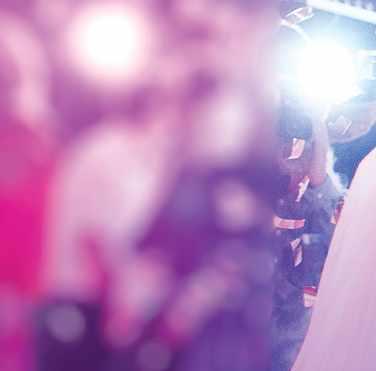





Bar & Batmitzvah


11AM to 4PM SUNDAY 2025 NOV 30


610 The Avenue @ Village London Watford
Centennial Park, Elstree, WD6 3SZ






